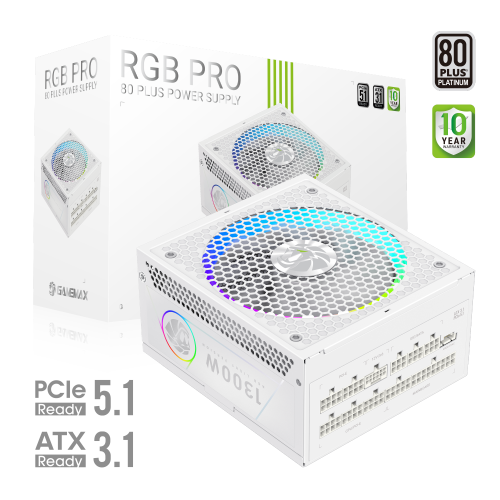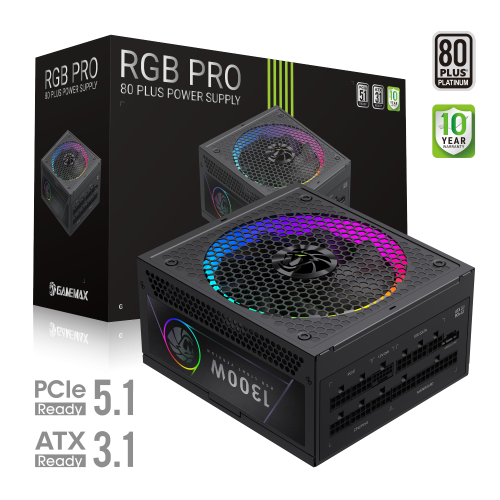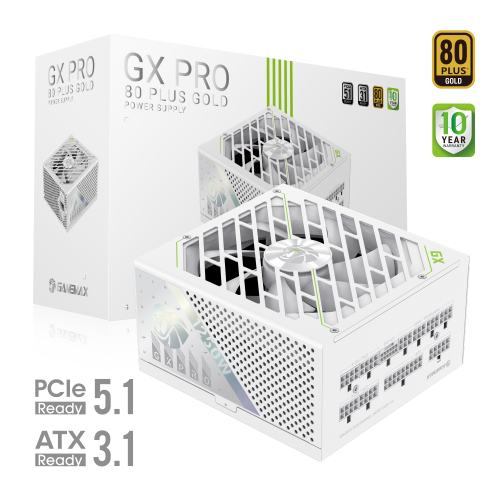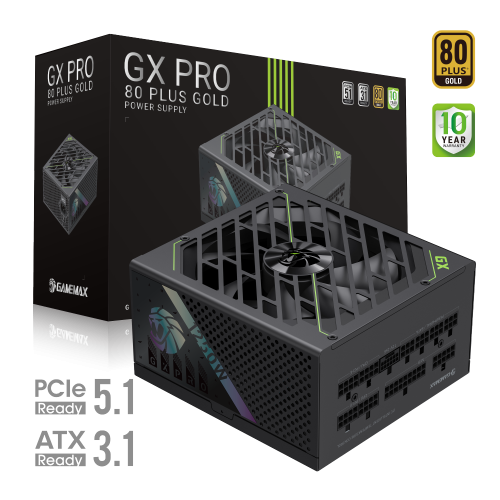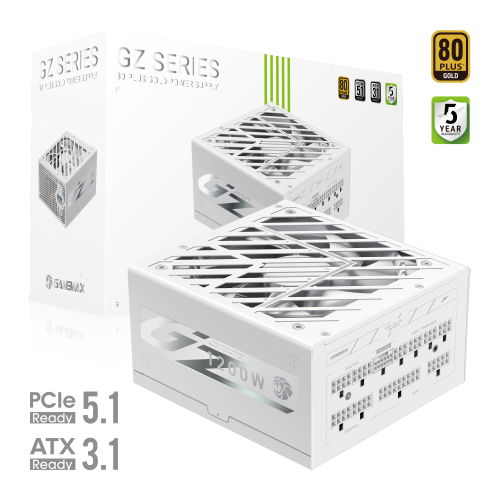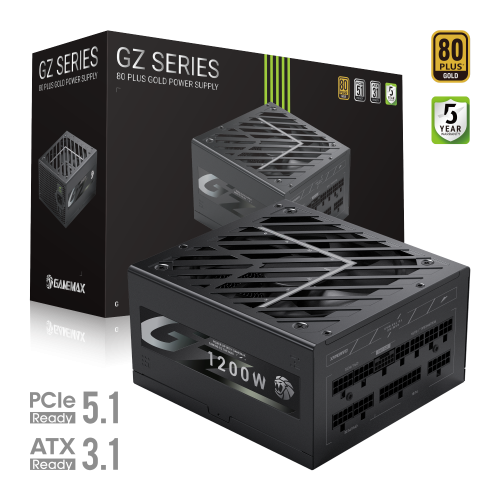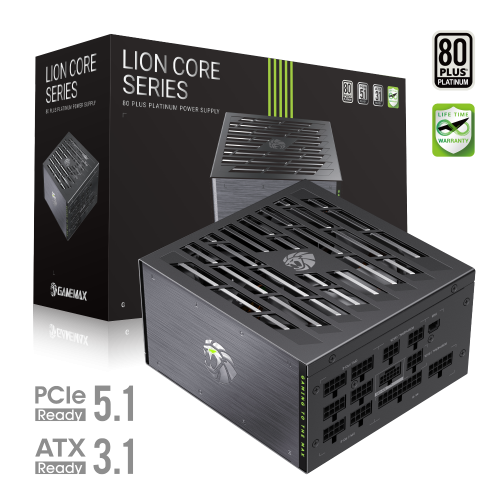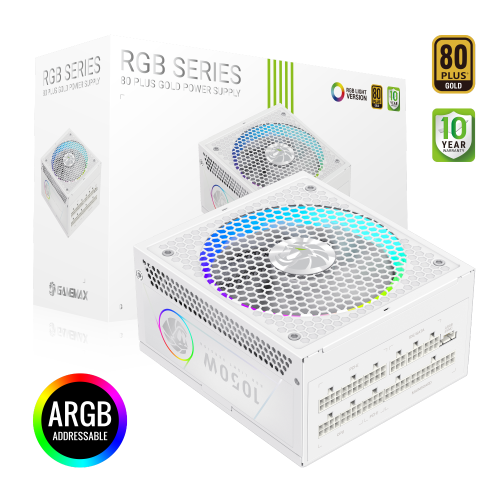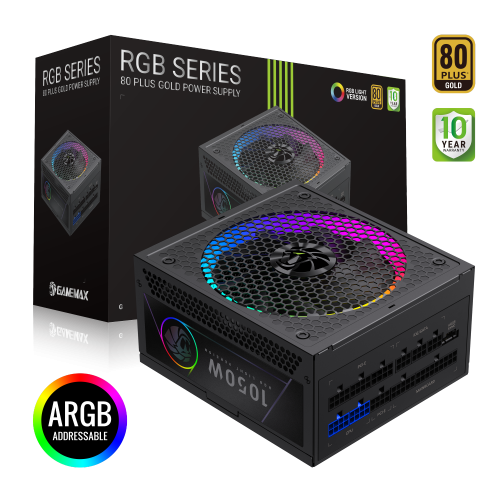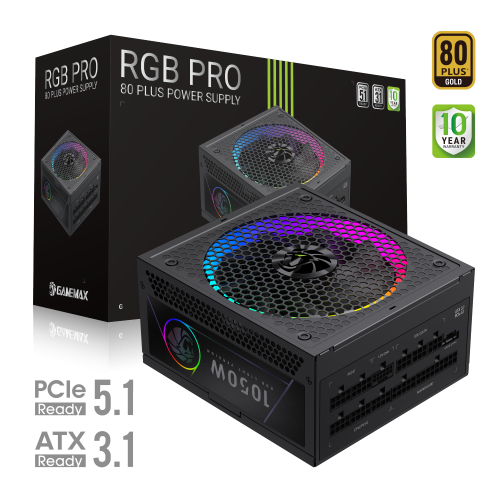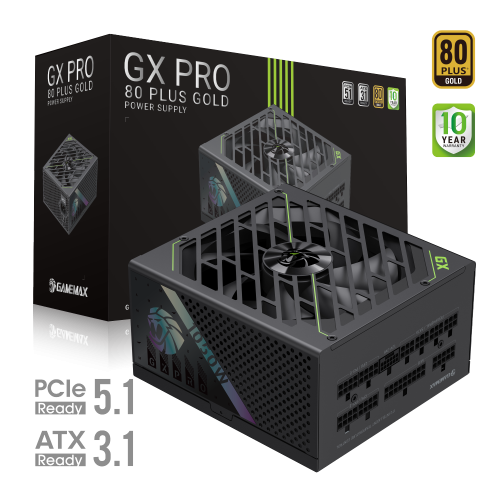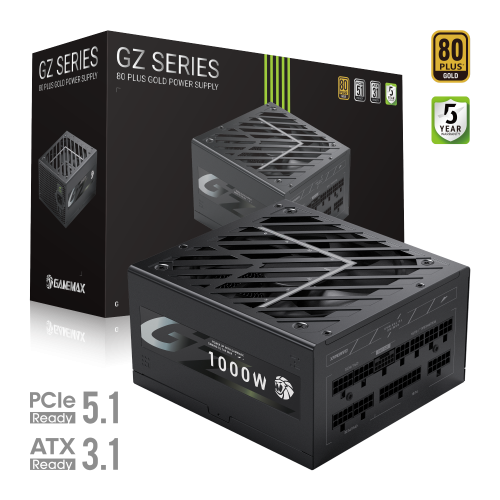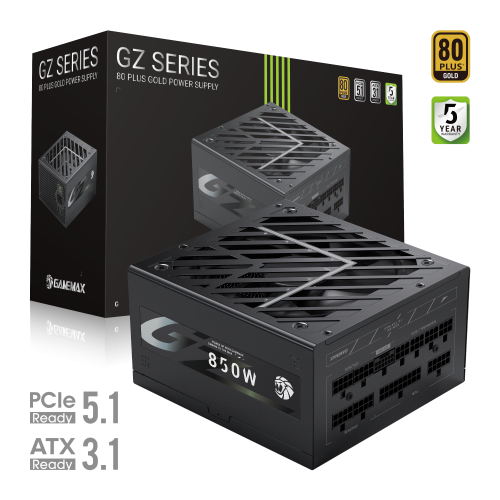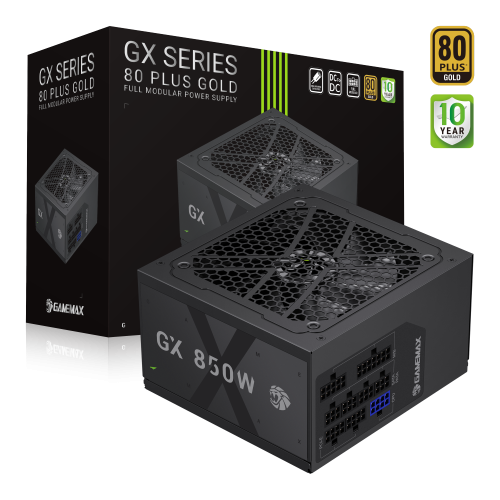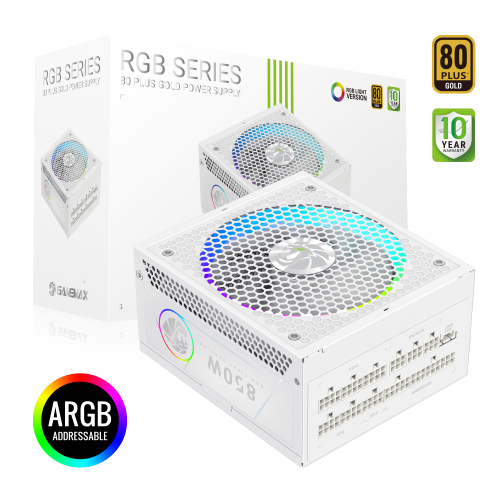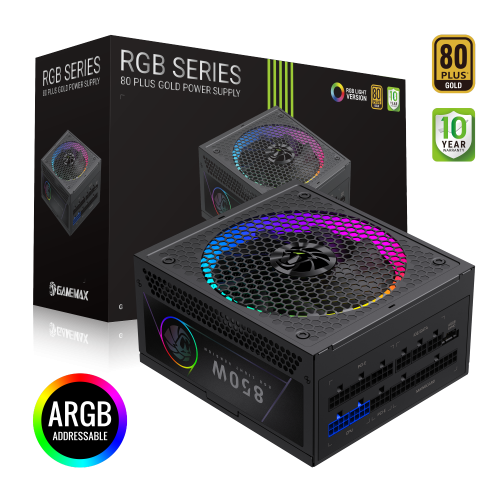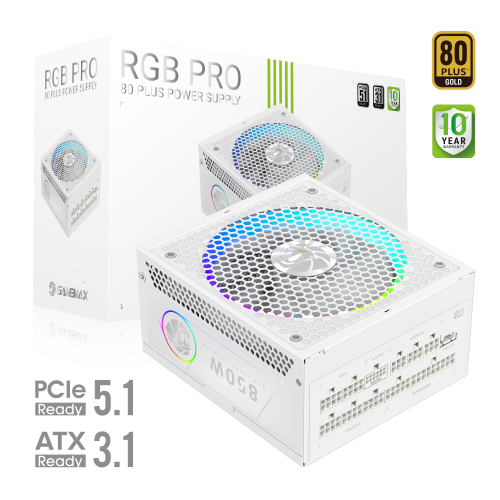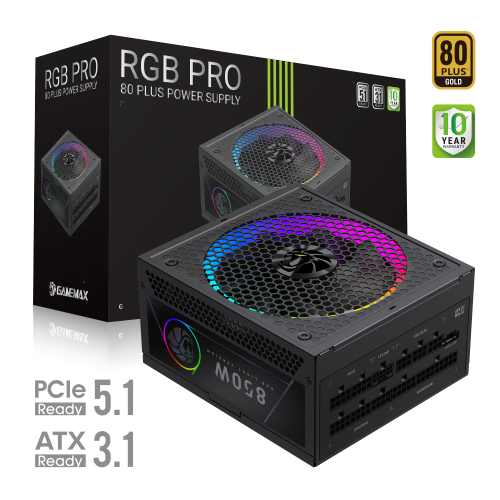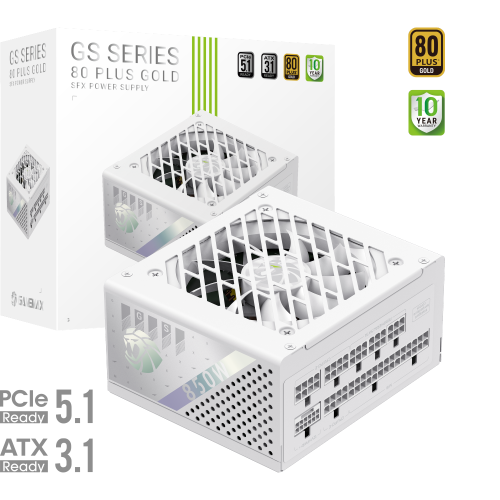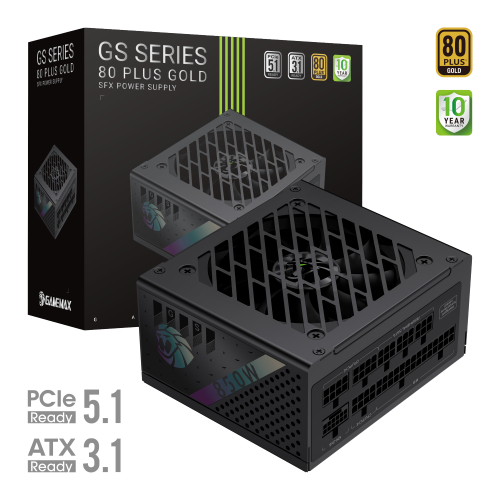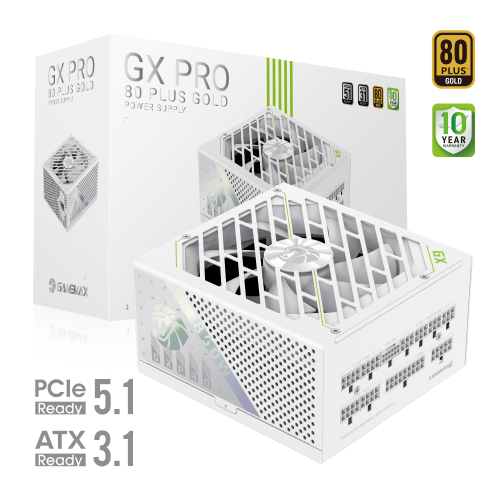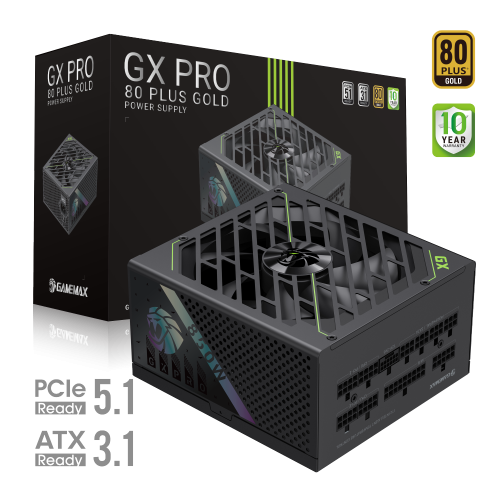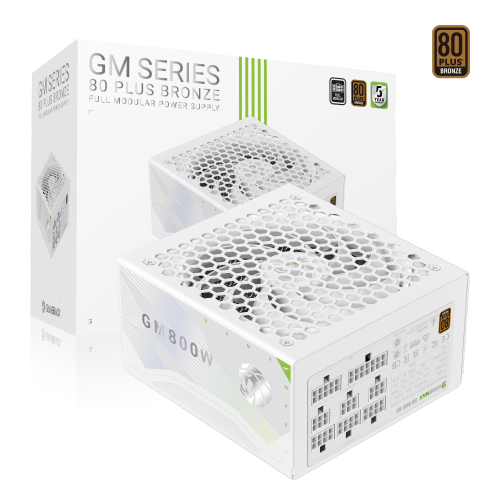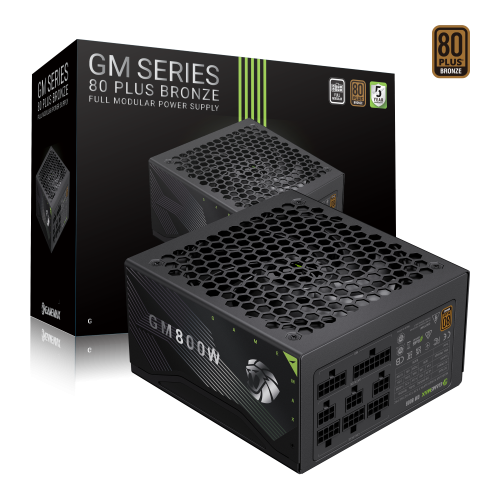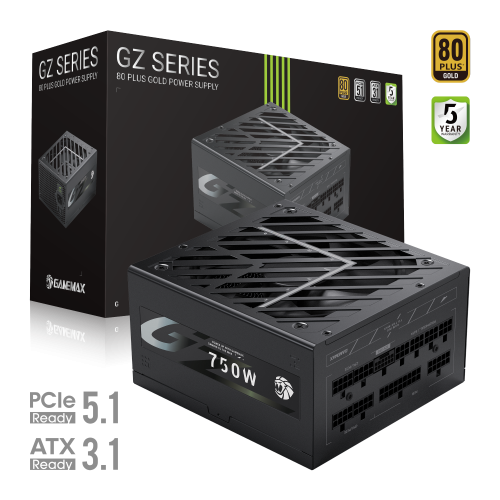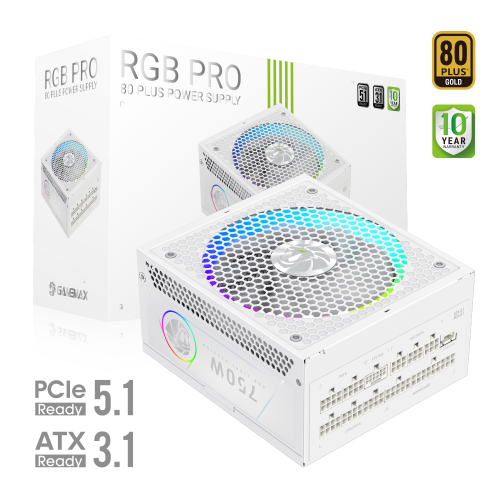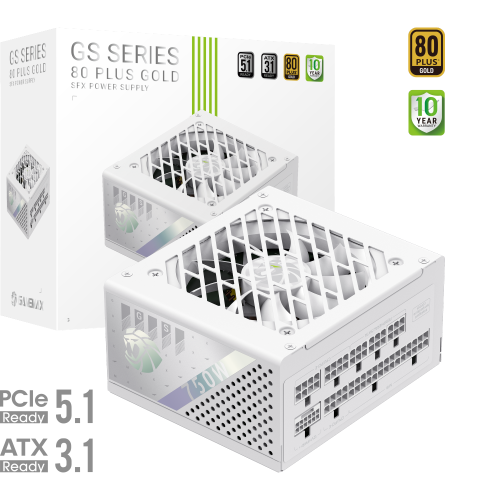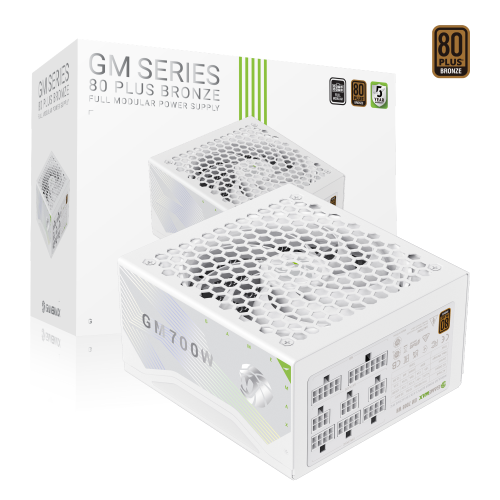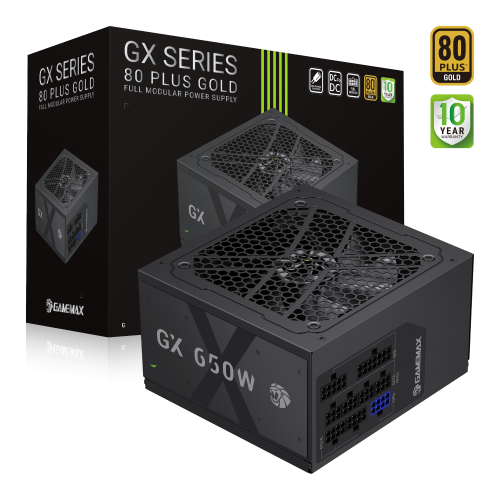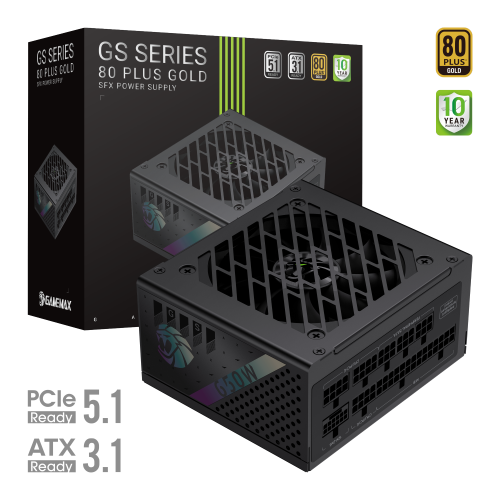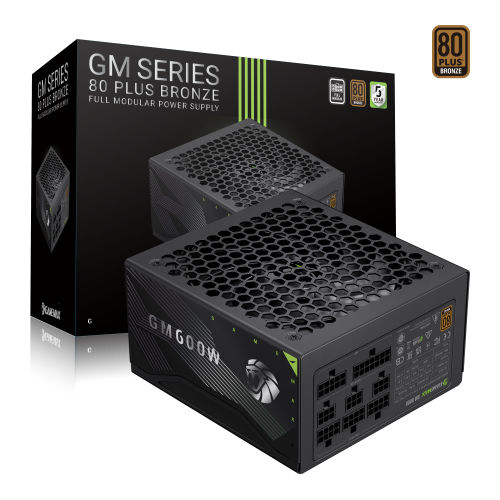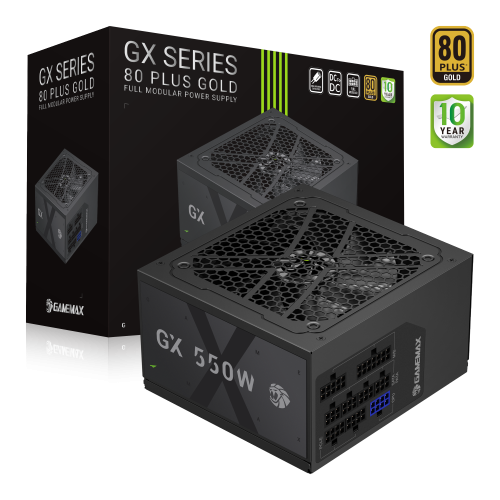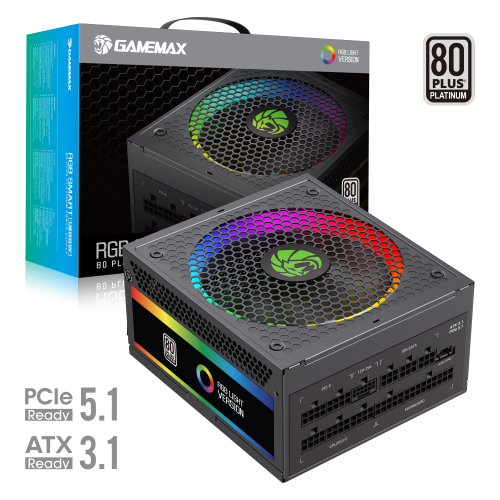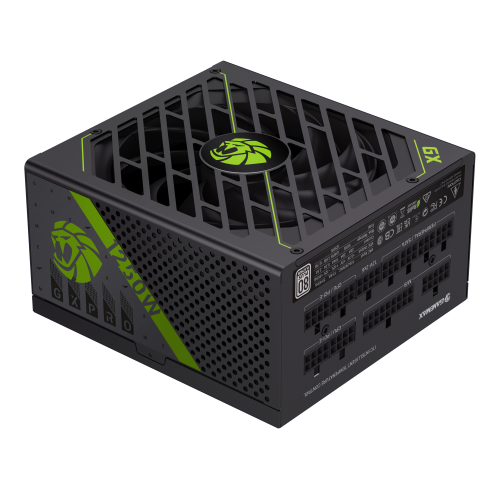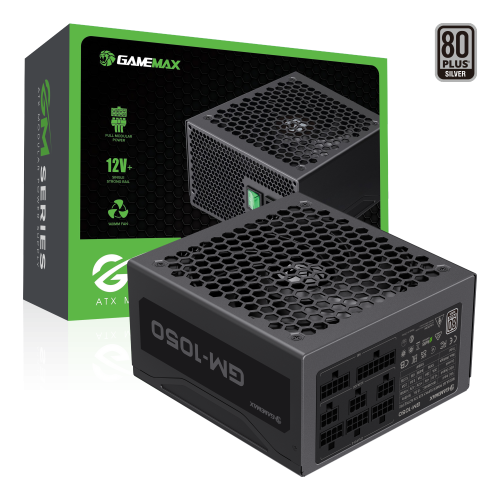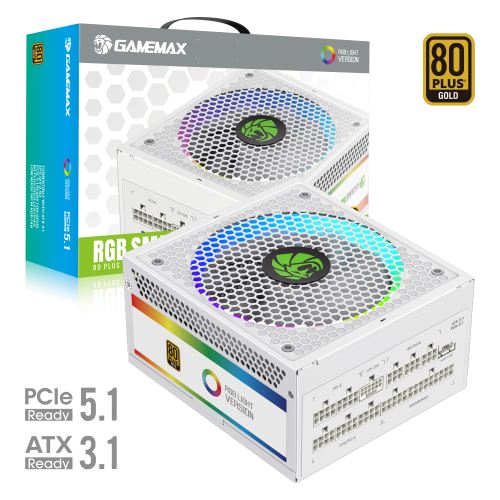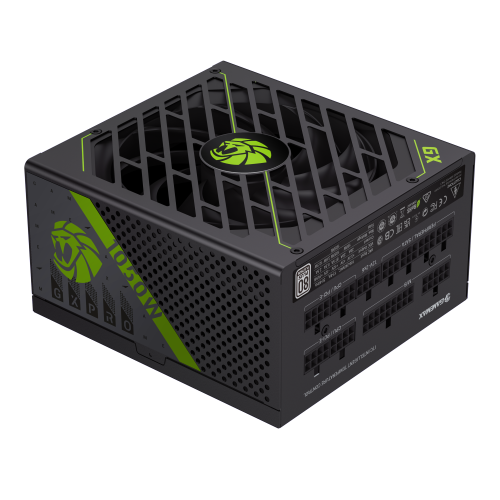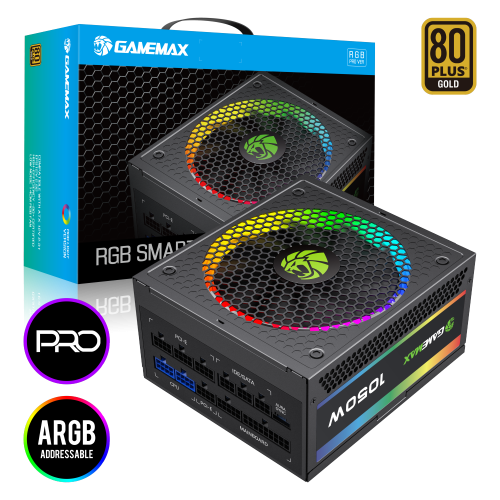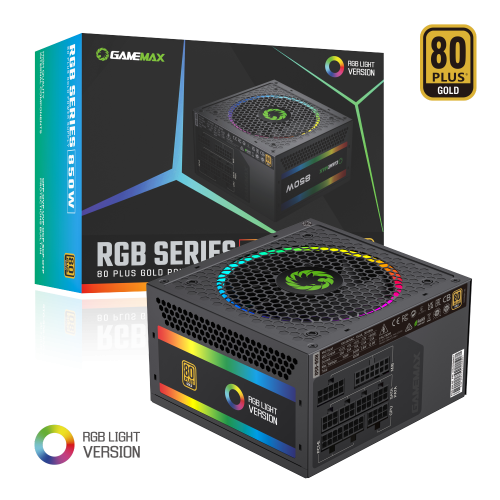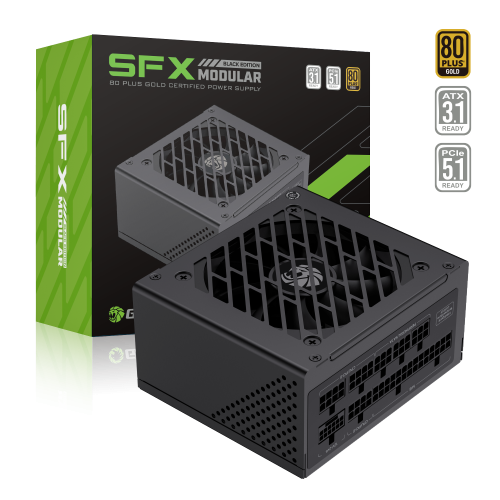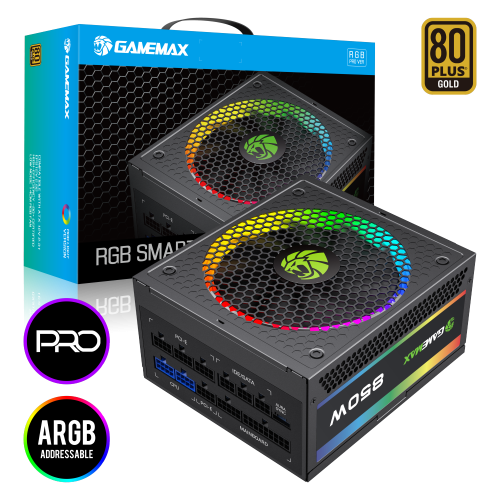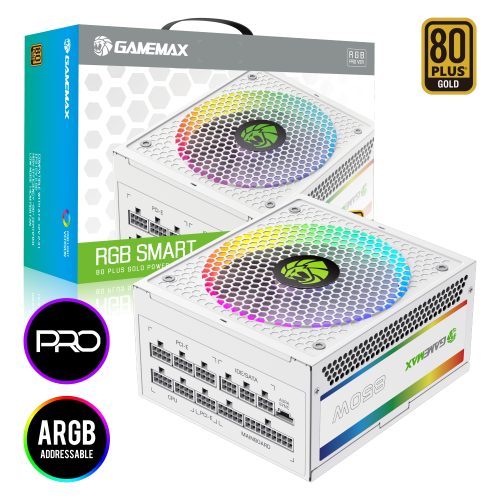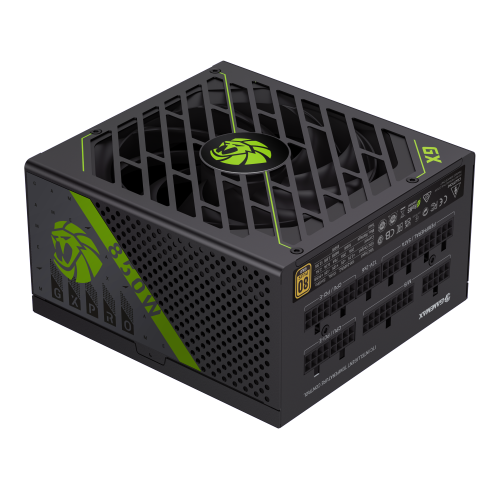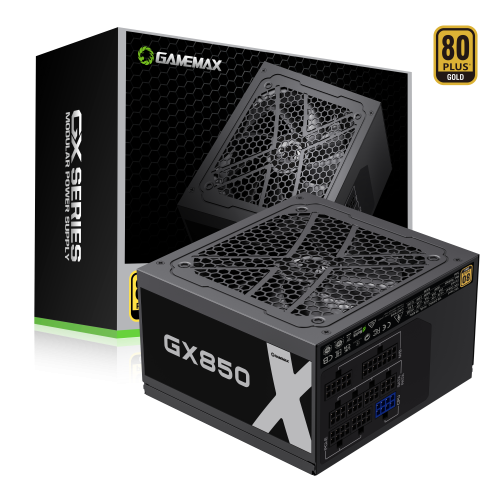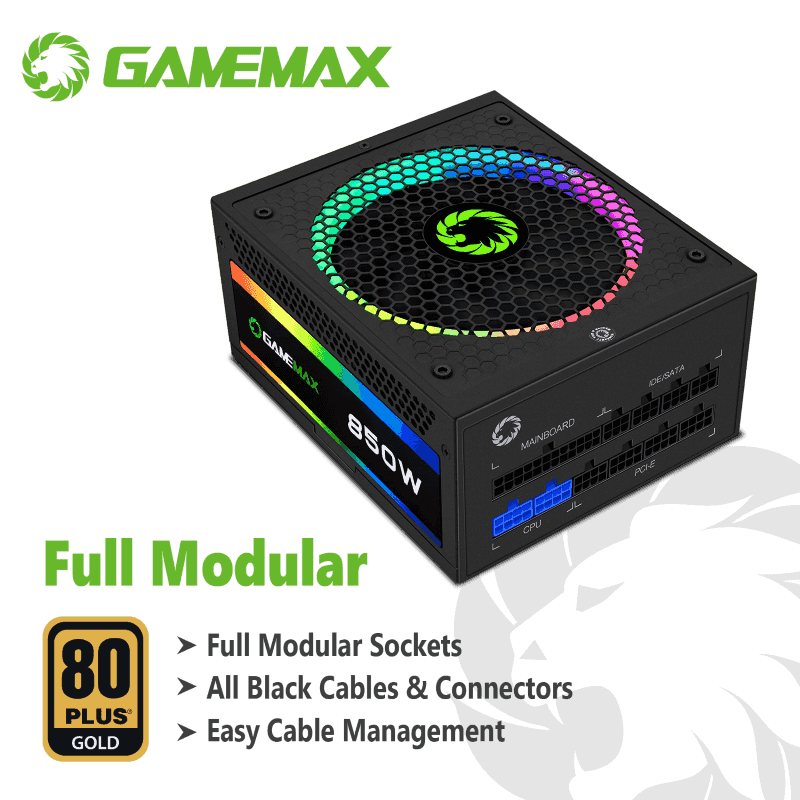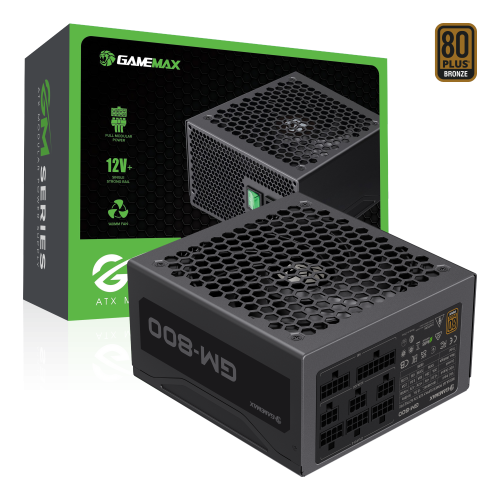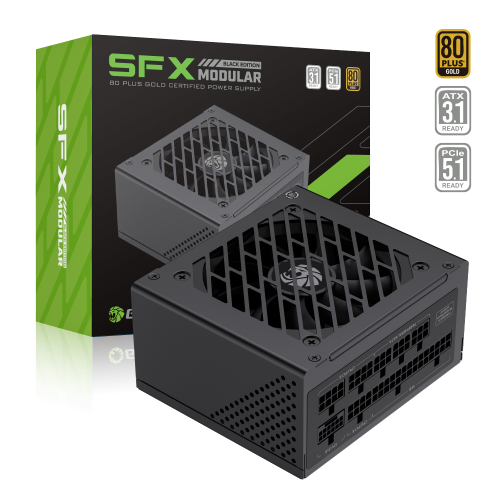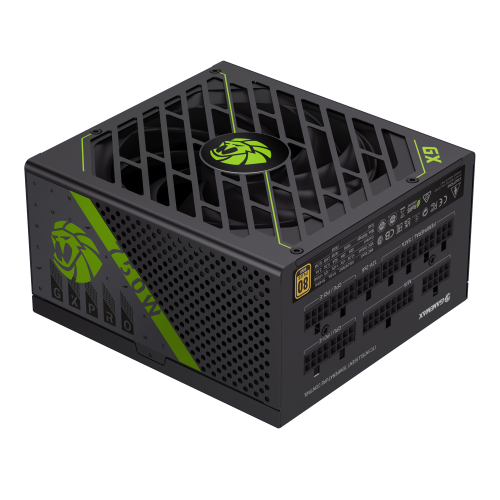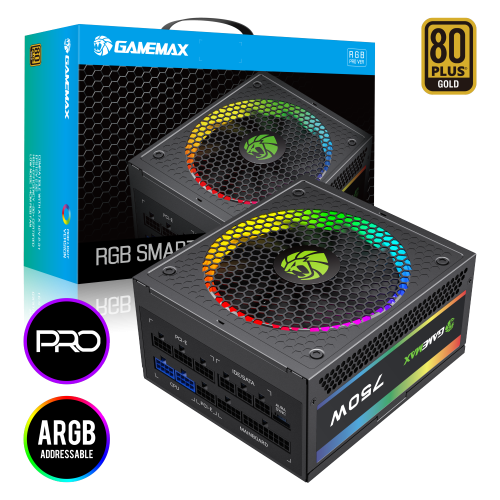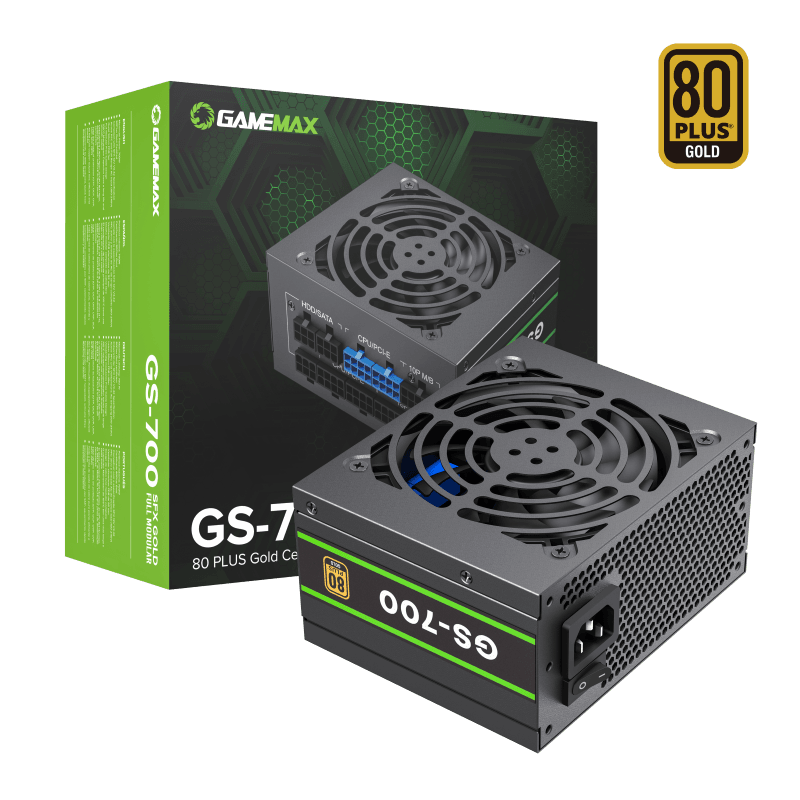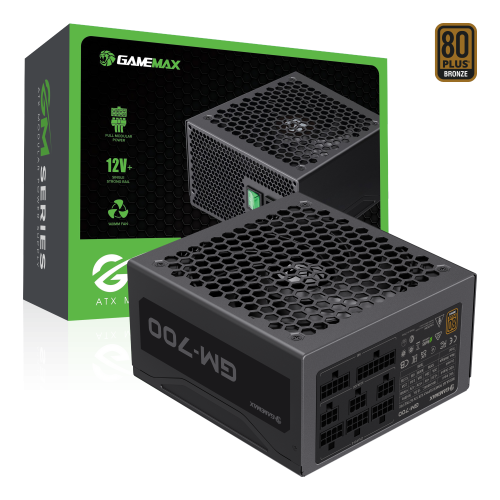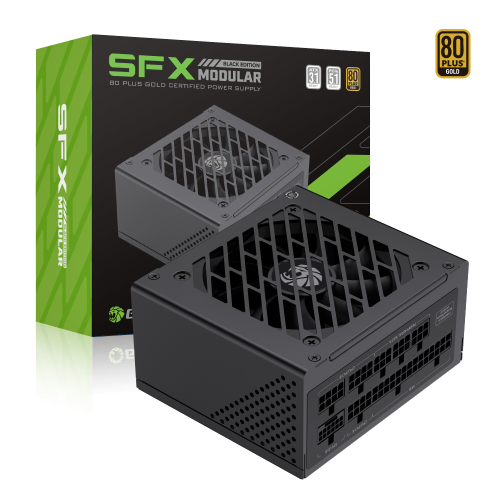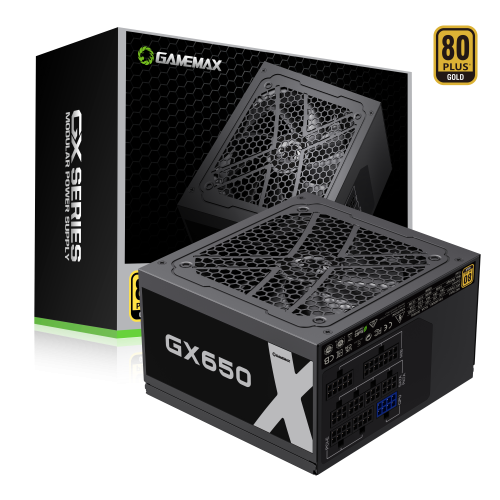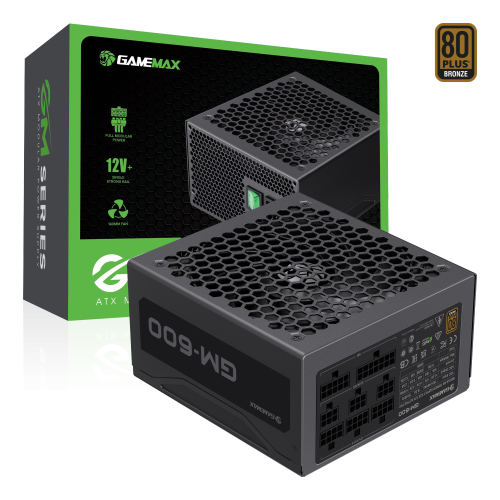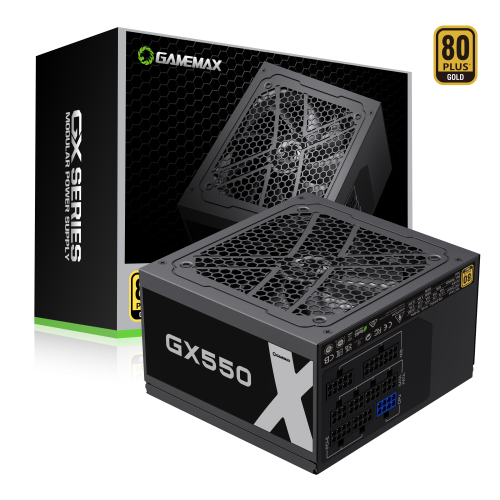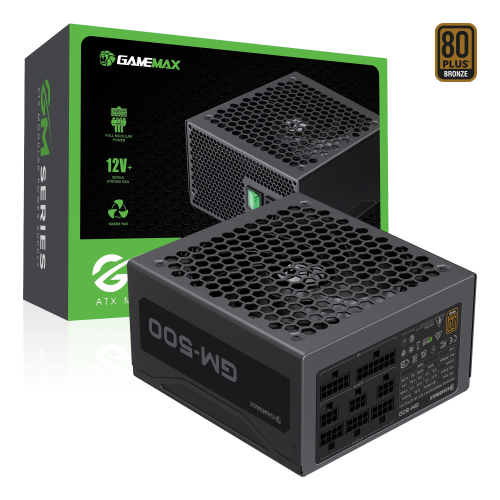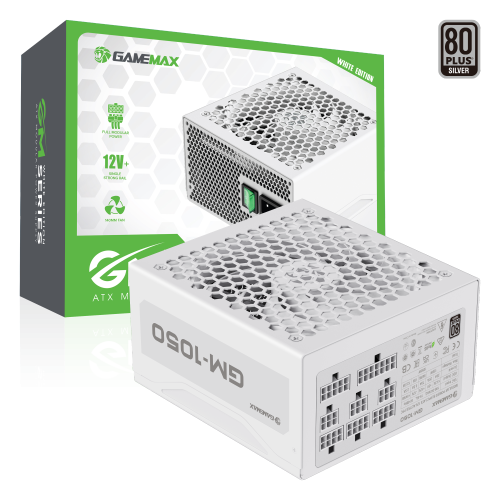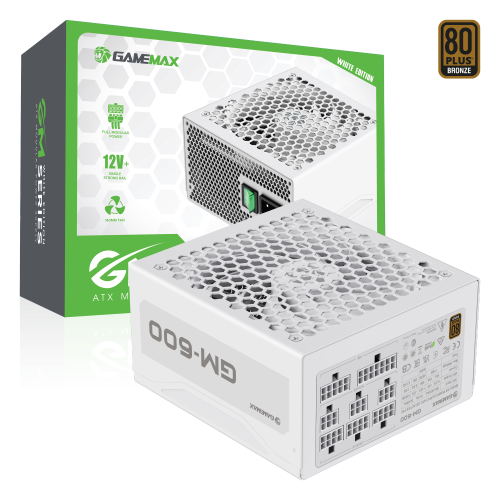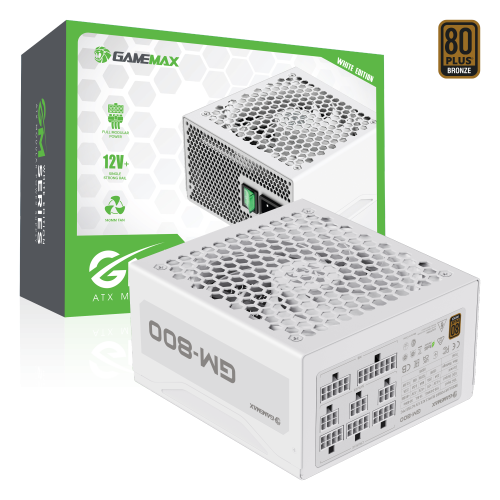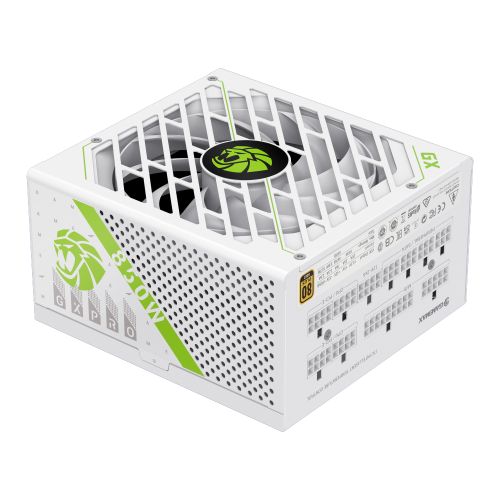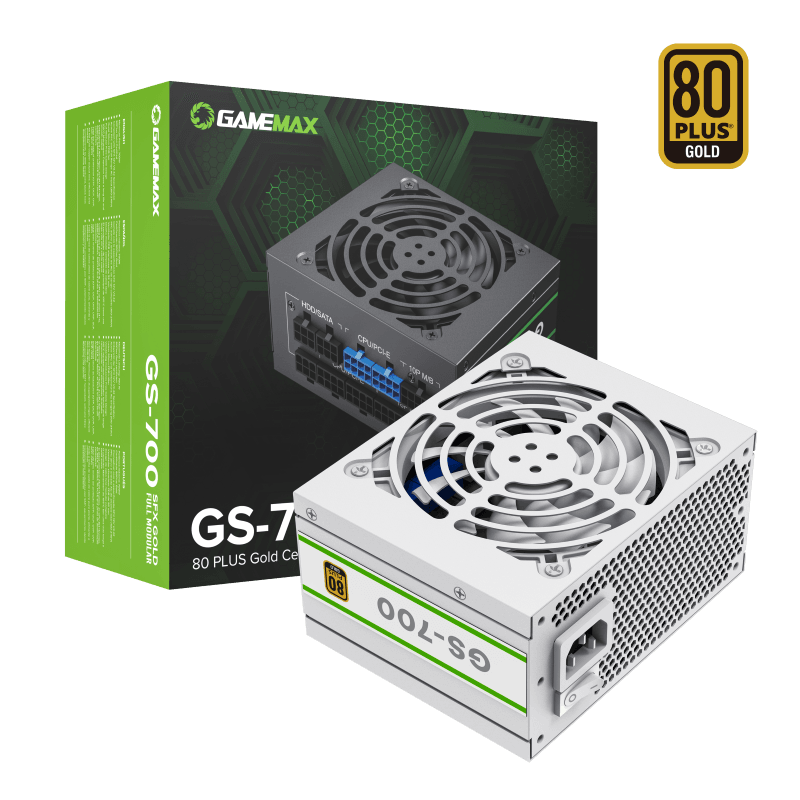-

RGB PRO 1300P WH 1300W 80+ Platinum ATX3.1 Power Supply with Adaptive Fan & ARGB SYNC
• 80 Plus Platinum Efficiency: Delivers 92%+ efficiency under typical loads, cutting power use and noise for dependable performance.
• ATX3.1 & PCIe5.1 Support: Native 12V-2x6 connector ensures seamless power to RTX 40/50 GPUs, optimizing delivery and reducing loss.
• Adaptive Fan Control: 14CM fan auto-adjusts speed based on load, balancing energy efficiency with quiet operation.
• High-Quality Components: Japanese 105°C and solid capacitors guarantee durability, stability, and reliability for intensive tasks.
• Customizable RGB Lighting: 25 lighting modes with memory and ARGB SYNC support, enabling personalized and synchronized visual effects. -

RGB PRO 1300P 1300W 80+ Platinum ATX3.1 Power Supply with Adaptive Fan & ARGB SYNC
• 80 Plus Platinum Efficiency: Delivers 92%+ efficiency under typical loads, cutting power use and noise for dependable performance.
• ATX3.1 & PCIe5.1 Support: Native 12V-2x6 connector ensures seamless power to RTX 40/50 GPUs, optimizing delivery and reducing loss.
• Adaptive Fan Control: 14CM fan auto-adjusts speed based on load, balancing energy efficiency with quiet operation.
• High-Quality Components: Japanese 105°C and solid capacitors guarantee durability, stability, and reliability for intensive tasks.
• Customizable RGB Lighting: 25 lighting modes with memory and ARGB SYNC support, enabling personalized and synchronized visual effects. -

GX PRO 1250G 80 Plus Gold Modular Power Supply: ATX3.1 Ready, Silent Cooling, & Premium Durability
• 80 Plus Gold Efficiency & Quiet Operation: Achieves 90% efficiency under typical loads with APFC+LLC+DC-DC design, minimizing power waste and noise.
• Premium Durability & Reliability: Built with Japanese 105°C capacitors and solid capacitors for long-term stability and performance.
• ATX3.1 & PCIe5.1 Ready: Features a native 12V-2x6 connector for seamless RTX 40/50 GPU compatibility and efficient power delivery.
• Advanced Thermal Management: 13.5cm FDB fan with intelligent temperature control ensures quiet cooling and optimal heat dissipation.
• Modular Design & Robust Protection: Fully modular layout with dual-stage EMI filtering and NTC thermistor safeguards against surges, while gold-plated cables ensure durable, high-conductivity connections. -

GX PRO 1250G 80 Plus Gold Modular Power Supply: ATX3.1 Ready, Silent Cooling, & Premium Durability
• 80 Plus Gold Efficiency & Quiet Operation: Achieves 90% efficiency under typical loads with APFC+LLC+DC-DC design, minimizing power waste and noise.
• Premium Durability & Reliability: Built with Japanese 105°C capacitors and solid capacitors for long-term stability and performance.
• ATX3.1 & PCIe5.1 Ready: Features a native 12V-2x6 connector for seamless RTX 40/50 GPU compatibility and efficient power delivery.
• Advanced Thermal Management: 13.5cm FDB fan with intelligent temperature control ensures quiet cooling and optimal heat dissipation.
• Modular Design & Robust Protection: Fully modular layout with dual-stage EMI filtering and NTC thermistor safeguards against surges, while gold-plated cables ensure durable, high-conductivity connections. -

GAMEMAX GZ 1200w GOLD White Power Supply ATX3.1/PCIe5.1, 80 PLUS Gold certification, 5-year warranty.
• Supports ATX3.1 and PCIe5.1 standards with a native 12V-2x6 connector for direct RTX™ 40/50 series GPU connections, reducing current loss and improving performance.
• The asymmetrical design creates a strong visual distinction from the predominantly symmetrical PSUs.
• A 13.5cm low-RPM turbo axial fan with 0dB intelligent temperature control ensures ultra-quiet operation
• Japanese bulk capacitors rated for up to 105℃ ensures long-lasting durability and stable power delivery.
• Achieved 80 PLUS Gold, it delivers high efficiency, low noise, and consistent performance.
• Matrix-arranged solid capacitors reduce ripple and noise for cleaner and more stable power delivery.
• Dual-stage EMI filtering and anti-burn circuits protect the system from spikes, surges, and interference. -

GAMEMAX GZ 1200w GOLD Power Supply ATX3.1/PCIe5.1, 80 PLUS Gold certification, 5-year warranty.
• Supports ATX3.1 and PCIe5.1 standards with a native 12V-2x6 connector for direct RTX™ 40/50 series GPU connections, reducing current loss and improving performance.
• The asymmetrical design creates a strong visual distinction from the predominantly symmetrical PSUs.
• A 13.5cm low-RPM turbo axial fan with 0dB intelligent temperature control ensures ultra-quiet operation.
• Japanese bulk capacitors rated for up to 105℃ ensures long-lasting durability and stable power delivery.
• Achieved 80 PLUS Gold, it delivers high efficiency, low noise, and consistent performance.
• Matrix-arranged solid capacitors reduce ripple and noise for cleaner and more stable power delivery.
• Dual-stage EMI filtering and anti-burn circuits protect the system from spikes, surges, and interference. -

• The world’s first lifetime warranty for a power supply ensures unmatched confidence and peace of mind.
• Supports ATX3.1 and PCIe5.1 standards with a native 12V-2x6 connector for direct RTX™ 40/50 series GPU connections, reducing current loss and improving performance.
• The bold and stylish design enhances the aesthetic appeal of your build while delivering top-tier functionality.
• A 13.5cm low-RPM turbo axial fan with 0dB intelligent temperature control ensures ultra-quiet operation
• Built with sustainable and green materials, it minimizes environmental impact without compromising performance.
• 100% Japanese capacitors rated for up to 105℃ ensures long-lasting durability and stable power delivery.
• Matrix-arranged solid capacitors reduce ripple and noise for cleaner and more stable power delivery.
• Dual-stage EMI filtering and anti-burn circuits protect the system from spikes, surges, and interference.
• Thick cables with 11A gold-plated alloy terminals provide superior conductivity, reduced resistance, and exceptional durability. -

GameMax RGB 1050G WH Fully Modular Power Supply
• 80+ Gold Certified Efficiency: Achieves 90% efficiency or higher under typical loads, ensuring lower power consumption, reduced noise, and cooler operation.
• 140mm ARGB Fan with Sync: Delivers vibrant lighting effects and supports synchronization with ASUS, GIGABYTE, MSI, and ASRock RGB motherboards for customizable illumination.
• Fully Modular Design: 100% wireless internal PCB layout eliminates cable clutter for improved airflow and aesthetics.
• Enhanced Stability & Reliability: Powerful single +12V rail with high-quality Japanese capacitors ensures stable power delivery to graphics cards and PC components.
• Advanced Protection & Ultra-Quiet Operation: Includes OPP/OVP/UVP/SCP/OCP/SIP safeguards, paired with a whisper-quiet 140mm fan for optimal cooling and minimal noise. -

GameMax RGB 1050G Fully Modular Power Supply
• 80+ Gold Certified Efficiency: Achieves 90% efficiency or higher under typical loads, ensuring lower power consumption, reduced noise, and cooler operation.
• 140mm ARGB Fan with Sync: Delivers vibrant lighting effects and supports synchronization with ASUS, GIGABYTE, MSI, and ASRock RGB motherboards for customizable illumination.
• Fully Modular Design: 100% wireless internal PCB layout eliminates cable clutter for improved airflow and aesthetics.
• Enhanced Stability & Reliability: Powerful single +12V rail with high-quality Japanese capacitors ensures stable power delivery to graphics cards and PC components.
• Advanced Protection & Ultra-Quiet Operation: Includes OPP/OVP/UVP/SCP/OCP/SIP safeguards, paired with a whisper-quiet 140mm fan for optimal cooling and minimal noise. -

RGB PRO 1050G WH 1050W 80+ Gold ATX3.1 Power Supply with Adaptive Fan & ARGB SYNC
• 80 Plus Gold Efficiency: Delivers 90%+ efficiency under typical loads, cutting power use and noise for dependable performance.
• ATX3.1 & PCIe5.1 Support: Native 12V-2x6 connector ensures seamless power to RTX 40/50 GPUs, optimizing delivery and reducing loss.
• Adaptive Fan Control: 14CM fan auto-adjusts speed based on load, balancing energy efficiency with quiet operation.
• High-Quality Components: Japanese 105°C and solid capacitors guarantee durability, stability, and reliability for intensive tasks.
• Customizable RGB Lighting: 25 lighting modes with memory and ARGB SYNC support, enabling personalized and synchronized visual effects. -

RGB 1050G PRO 1050W 80+ Gold ATX3.1 Power Supply with Adaptive Fan & ARGB SYNC
• 80 Plus Gold Efficiency: Delivers 90%+ efficiency under typical loads, cutting power use and noise for dependable performance.
• ATX3.1 & PCIe5.1 Support: Native 12V-2x6 connector ensures seamless power to RTX 40/50 GPUs, optimizing delivery and reducing loss.
• Adaptive Fan Control: 14CM fan auto-adjusts speed based on load, balancing energy efficiency with quiet operation.
• High-Quality Components: Japanese 105°C and solid capacitors guarantee durability, stability, and reliability for intensive tasks.
• Customizable RGB Lighting: 25 lighting modes with memory and ARGB SYNC support, enabling personalized and synchronized visual effects. -

GX PRO 1050G 80 Plus Gold Modular Power Supply: ATX3.1 Ready, Silent Cooling, & Premium Durability
• 80 Plus Gold Efficiency & Quiet Operation: Achieves 90% efficiency under typical loads with APFC+LLC+DC-DC design, minimizing power waste and noise.
• Premium Durability & Reliability: Built with Japanese 105°C capacitors and solid capacitors for long-term stability and performance.
• ATX3.1 & PCIe5.1 Ready: Features a native 12V-2x6 connector for seamless RTX 40/50 GPU compatibility and efficient power delivery.
• Advanced Thermal Management: 13.5cm FDB fan with intelligent temperature control ensures quiet cooling and optimal heat dissipation.
• Modular Design & Robust Protection: Fully modular layout with dual-stage EMI filtering and NTC thermistor safeguards against surges, while gold-plated cables ensure durable, high-conductivity connections. -

GX PRO 1050G 80 Plus Gold Modular Power Supply: ATX3.1 Ready, Silent Cooling, & Premium Durability
• 80 Plus Gold Efficiency & Quiet Operation: Achieves 90% efficiency under typical loads with APFC+LLC+DC-DC design, minimizing power waste and noise.
• Premium Durability & Reliability: Built with Japanese 105°C capacitors and solid capacitors for long-term stability and performance.
• ATX3.1 & PCIe5.1 Ready: Features a native 12V-2x6 connector for seamless RTX 40/50 GPU compatibility and efficient power delivery.
• Advanced Thermal Management: 13.5cm FDB fan with intelligent temperature control ensures quiet cooling and optimal heat dissipation.
• Modular Design & Robust Protection: Fully modular layout with dual-stage EMI filtering and NTC thermistor safeguards against surges, while gold-plated cables ensure durable, high-conductivity connections. -

GAMEMAX GZ 1000w GOLD White Power Supply ATX3.1/PCIe5.1, 80 PLUS Gold certification, 5-year warranty.
• Supports ATX3.1 and PCIe5.1 standards with a native 12V-2x6 connector for direct RTX™ 40/50 series GPU connections, reducing current loss and improving performance.
• The asymmetrical design creates a strong visual distinction from the predominantly symmetrical PSUs.
• A 13.5cm low-RPM turbo axial fan with 0dB intelligent temperature control ensures ultra-quiet operation.
• Japanese bulk capacitors rated for up to 105℃ ensures long-lasting durability and stable power delivery.
• Achieved 80 PLUS Gold, it delivers high efficiency, low noise, and consistent performance.
• Matrix-arranged solid capacitors reduce ripple and noise for cleaner and more stable power delivery.
• Dual-stage EMI filtering and anti-burn circuits protect the system from spikes, surges, and interference. -

GAMEMAX GZ 1000w GOLD Power Supply ATX3.1/PCIe5.1, 80 PLUS Gold certification, 5-year warranty.
• Supports ATX3.1 and PCIe5.1 standards with a native 12V-2x6 connector for direct RTX™ 40/50 series GPU connections, reducing current loss and improving performance.
• The asymmetrical design creates a strong visual distinction from the predominantly symmetrical PSUs.
• A 13.5cm low-RPM turbo axial fan with 0dB intelligent temperature control ensures ultra-quiet operation.
• Japanese bulk capacitors rated for up to 105℃ ensures long-lasting durability and stable power delivery.
• Achieved 80 PLUS Gold, it delivers high efficiency, low noise, and consistent performance.
• Matrix-arranged solid capacitors reduce ripple and noise for cleaner and more stable power delivery.
• Dual-stage EMI filtering and anti-burn circuits protect the system from spikes, surges, and interference. -

• The world’s first lifetime warranty for a power supply ensures unmatched confidence and peace of mind.
• Supports ATX3.1 and PCIe5.1 standards with a native 12V-2x6 connector for direct RTX™ 40/50 series GPU connections, reducing current loss and improving performance.
• The bold and stylish design enhances the aesthetic appeal of your build while delivering top-tier functionality.
• A 13.5cm low-RPM turbo axial fan with 0dB intelligent temperature control ensures ultra-quiet operation
• Built with sustainable and green materials, it minimizes environmental impact without compromising performance.
• 100% Japanese capacitors rated for up to 105℃ ensures long-lasting durability and stable power delivery.
• Matrix-arranged solid capacitors reduce ripple and noise for cleaner and more stable power delivery.
• Dual-stage EMI filtering and anti-burn circuits protect the system from spikes, surges, and interference.
• Thick cables with 11A gold-plated alloy terminals provide superior conductivity, reduced resistance, and exceptional durability. -

GAMEMAX GZ 850w GOLD White Power Supply ATX3.1/PCIe5.1, 80 PLUS Gold certification, 5-year warranty.
• Supports ATX3.1 and PCIe5.1 standards with a native 12V-2x6 connector for direct RTX™ 40/50 series GPU connections, reducing current loss and improving performance.
• The asymmetrical design creates a strong visual distinction from the predominantly symmetrical PSUs.
• A 13.5cm low-RPM turbo axial fan with 0dB intelligent temperature control ensures ultra-quiet operation.
• Japanese bulk capacitors rated for up to 105℃ ensures long-lasting durability and stable power delivery.
• Achieved 80 PLUS Gold, it delivers high efficiency, low noise, and consistent performance.
• Matrix-arranged solid capacitors reduce ripple and noise for cleaner and more stable power delivery.
• Dual-stage EMI filtering and anti-burn circuits protect the system from spikes, surges, and interference. -

GAMEMAX GZ 850w GOLD Power Supply ATX3.1/PCIe5.1, 80 PLUS Gold certification, 5-year warranty.
• Supports ATX3.1 and PCIe5.1 standards with a native 12V-2x6 connector for direct RTX™ 40/50 series GPU connections, reducing current loss and improving performance.
• The asymmetrical design creates a strong visual distinction from the predominantly symmetrical PSUs.
• A 13.5cm low-RPM turbo axial fan with 0dB intelligent temperature control ensures ultra-quiet operation.
• Japanese bulk capacitors rated for up to 105℃ ensures long-lasting durability and stable power delivery.
• Achieved 80 PLUS Gold, it delivers high efficiency, low noise, and consistent performance.
• Matrix-arranged solid capacitors reduce ripple and noise for cleaner and more stable power delivery.
• Dual-stage EMI filtering and anti-burn circuits protect the system from spikes, surges, and interference. -

The GameMax GX 850GF Modular Power Supply, 80+ Gold certified, offers top-tier performance in a compact package. Key features:
• High Efficiency: Over 92% efficient with LLC & DC-DC technology for energy savings.
• Silent & Cool: HDB fan for whisper-quiet operation and effective heat dissipation.
• Modular Design: Easy cable management for a cleaner build and improved airflow.
• Stable & Durable: All-solid capacitors and SMT components ensure long-lasting reliability.
• Broad Compatibility: Supports latest graphics cards and full voltage input range.
• Protection: Seven levels of safeguards protect your system from harm. -

GameMax RGB 850W White Fully Modular Power Supply, 80+ Gold Efficiency, 140mm ARGB Sync Fan, Japanese Capacitors, Ultra-Quiet Desktop Power Supply
• 80+ Gold Certified Efficiency: Achieves 90% efficiency or higher under typical loads, ensuring lower power consumption, reduced noise, and cooler operation.
• 140mm ARGB Fan with Sync: Delivers vibrant lighting effects and supports synchronization with ASUS, GIGABYTE, MSI, and ASRock RGB motherboards for customizable illumination.
• Fully Modular Design: 100% wireless internal PCB layout eliminates cable clutter for improved airflow and aesthetics.
• Enhanced Stability & Reliability: Powerful single +12V rail with high-quality Japanese capacitors ensures stable power delivery to graphics cards and PC components.
• Advanced Protection & Ultra-Quiet Operation: Includes OPP/OVP/UVP/SCP/OCP/SIP safeguards, paired with a whisper-quiet 140mm fan for optimal cooling and minimal noise. -

GameMax RGB 850W Black Fully Modular Power Supply, 80+ Gold Efficiency, 140mm ARGB Sync Fan, Japanese Capacitors, Ultra-Quiet Desktop Power Supply
• 80+ Gold Certified Efficiency: Achieves 90% efficiency or higher under typical loads, ensuring lower power consumption, reduced noise, and cooler operation.
• 140mm ARGB Fan with Sync: Delivers vibrant lighting effects and supports synchronization with ASUS, GIGABYTE, MSI, and ASRock RGB motherboards for customizable illumination.
• Fully Modular Design: 100% wireless internal PCB layout eliminates cable clutter for improved airflow and aesthetics.
• Enhanced Stability & Reliability: Powerful single +12V rail with high-quality Japanese capacitors ensures stable power delivery to graphics cards and PC components.
• Advanced Protection & Ultra-Quiet Operation: Includes OPP/OVP/UVP/SCP/OCP/SIP safeguards, paired with a whisper-quiet 140mm fan for optimal cooling and minimal noise. -

RGB PRO 850G WH 850W 80+ Gold ATX3.1 Power Supply with Adaptive Fan & ARGB SYNC
• 80 Plus Gold Efficiency: Delivers 90%+ efficiency under typical loads, cutting power use and noise for dependable performance.
• ATX3.1 & PCIe5.1 Support: Native 12V-2x6 connector ensures seamless power to RTX 40/50 GPUs, optimizing delivery and reducing loss.
• Adaptive Fan Control: 14CM fan auto-adjusts speed based on load, balancing energy efficiency with quiet operation.
• High-Quality Components: Japanese 105°C and solid capacitors guarantee durability, stability, and reliability for intensive tasks.
• Customizable RGB Lighting: 25 lighting modes with memory and ARGB SYNC support, enabling personalized and synchronized visual effects. -

RGB PRO 850G 850W 80+ Gold ATX3.1 Power Supply with Adaptive Fan & ARGB SYNC
• 80 Plus Gold Efficiency: Delivers 90%+ efficiency under typical loads, cutting power use and noise for dependable performance.
• ATX3.1 & PCIe5.1 Support: Native 12V-2x6 connector ensures seamless power to RTX 40/50 GPUs, optimizing delivery and reducing loss.
• Adaptive Fan Control: 14CM fan auto-adjusts speed based on load, balancing energy efficiency with quiet operation.
• High-Quality Components: Japanese 105°C and solid capacitors guarantee durability, stability, and reliability for intensive tasks.
• Customizable RGB Lighting: 25 lighting modes with memory and ARGB SYNC support, enabling personalized and synchronized visual effects. -

GS 850G 80 Plus Gold Certified SFX Power Supply with Intelligent Cooling, Japanese Capacitors, and Comprehensive Protection
• 80 Plus Gold Certified Efficiency: Enhances power efficiency and stability, reducing the risk of system crashes.
• High-Quality Japanese Capacitors: Ensures long-term reliability and stability with 105°C electrolytic and solid-state capacitors.
• Intelligent Fan Control: 9.2cm hydraulic bearing fan with PWM automatic control starts and stops based on power consumption (above 20% and below), optimizing cooling and noise.
• Advanced Wireless Output Design: Gold-plated pins and high-density copper posts enable efficient, reliable power output and improved heat dissipation.
• Comprehensive Circuit Protection: Provides multi-layered protection (OPP, OVP, UVP, OCP, SCP, OTP) to safeguard your PC and components from damage. -

GS 850G 80 Plus Gold Certified SFX Power Supply with Intelligent Cooling, Japanese Capacitors, and Comprehensive Protection
• 80 Plus Gold Certified Efficiency: Enhances power efficiency and stability, reducing the risk of system crashes.
• High-Quality Japanese Capacitors: Ensures long-term reliability and stability with 105°C electrolytic and solid-state capacitors.
• Intelligent Fan Control: 9.2cm hydraulic bearing fan with PWM automatic control starts and stops based on power consumption (above 20% and below), optimizing cooling and noise.
• Advanced Wireless Output Design: Gold-plated pins and high-density copper posts enable efficient, reliable power output and improved heat dissipation.
• Comprehensive Circuit Protection: Provides multi-layered protection (OPP, OVP, UVP, OCP, SCP, OTP) to safeguard your PC and components from damage. -

GX PRO 850G 80 Plus Gold Modular Power Supply: ATX3.1 Ready, Silent Cooling, & Premium Durability
• 80 Plus Gold Efficiency & Quiet Operation: Achieves 90% efficiency under typical loads with APFC+LLC+DC-DC design, minimizing power waste and noise.
• Premium Durability & Reliability: Built with Japanese 105°C capacitors and solid capacitors for long-term stability and performance.
• ATX3.1 & PCIe5.1 Ready: Features a native 12V-2x6 connector for seamless RTX 40/50 GPU compatibility and efficient power delivery.
• Advanced Thermal Management: 13.5cm FDB fan with intelligent temperature control ensures quiet cooling and optimal heat dissipation.
• Modular Design & Robust Protection: Fully modular layout with dual-stage EMI filtering and NTC thermistor safeguards against surges, while gold-plated cables ensure durable, high-conductivity connections. -

GX PRO 850G 80 Plus Gold Modular Power Supply: ATX3.1 Ready, Silent Cooling, & Premium Durability
• 80 Plus Gold Efficiency & Quiet Operation: Achieves 90% efficiency under typical loads with APFC+LLC+DC-DC design, minimizing power waste and noise.
• Premium Durability & Reliability: Built with Japanese 105°C capacitors and solid capacitors for long-term stability and performance.
• ATX3.1 & PCIe5.1 Ready: Features a native 12V-2x6 connector for seamless RTX 40/50 GPU compatibility and efficient power delivery.
• Advanced Thermal Management: 13.5cm FDB fan with intelligent temperature control ensures quiet cooling and optimal heat dissipation.
• Modular Design & Robust Protection: Fully modular layout with dual-stage EMI filtering and NTC thermistor safeguards against surges, while gold-plated cables ensure durable, high-conductivity connections. -

GAMEMAX GM White 800W 80+ Bronze Plus Efficient Power Supply with Smart Fan Control, Premium Capacitors, and EMI Protection
• 80 Plus Efficient Architecture: Enhances conversion efficiency for stable power delivery, preventing blue screens.
• Premium Taiwan Capacitors: Ensures temperature resistance, long lifespan, and reliable power output.
• 140mm Smart Fan Control: Automatically adjusts fan speed based on load, saving energy and maintaining low noise.
• Wireless Modular Design: Copper plate connection between back panel and PCB reduces errors and improves power quality.
• Level 2 EMI Protection: Filters stray waves and noise, ensuring reliable operation with integrated energy storage inductor for reduced EMI and heat. -

GAMEMAX GM 800W 80+ Bronze Plus Efficient Power Supply with Smart Fan Control, Premium Capacitors, and EMI Protection
• 80 Plus Efficient Architecture: Enhances conversion efficiency for stable power delivery, preventing blue screens.
• Premium Taiwan Capacitors: Ensures temperature resistance, long lifespan, and reliable power output.
• 140mm Smart Fan Control: Automatically adjusts fan speed based on load, saving energy and maintaining low noise.
• Wireless Modular Design: Copper plate connection between back panel and PCB reduces errors and improves power quality.
• Level 2 EMI Protection: Filters stray waves and noise, ensuring reliable operation with integrated energy storage inductor for reduced EMI and heat. -

GAMEMAX GZ 750w GOLD White Power Supply ATX3.1/PCIe5.1, 80 PLUS Gold certification, 5-year warranty.
• Supports ATX3.1 and PCIe5.1 standards with a native 12V-2x6 connector for direct RTX™ 40/50 series GPU connections, reducing current loss and improving performance.
• The asymmetrical design creates a strong visual distinction from the predominantly symmetrical PSUs.
• A 13.5cm low-RPM turbo axial fan with 0dB intelligent temperature control ensures ultra-quiet operation.
• Japanese bulk capacitors rated for up to 105℃ ensures long-lasting durability and stable power delivery.
• Achieved 80 PLUS Gold, it delivers high efficiency, low noise, and consistent performance.
• Matrix-arranged solid capacitors reduce ripple and noise for cleaner and more stable power delivery.
• Dual-stage EMI filtering and anti-burn circuits protect the system from spikes, surges, and interference. -

GAMEMAX GZ 750w GOLD Power Supply ATX3.1/PCIe5.1, 80 PLUS Gold certification, 5-year warranty.
• Supports ATX3.1 and PCIe5.1 standards with a native 12V-2x6 connector for direct RTX™ 40/50 series GPU connections, reducing current loss and improving performance.
• The asymmetrical design creates a strong visual distinction from the predominantly symmetrical PSUs.
• A 13.5cm low-RPM turbo axial fan with 0dB intelligent temperature control ensures ultra-quiet operation.
• Japanese bulk capacitors rated for up to 105℃ ensures long-lasting durability and stable power delivery.
• Achieved 80 PLUS Gold, it delivers high efficiency, low noise, and consistent performance.
• Matrix-arranged solid capacitors reduce ripple and noise for cleaner and more stable power delivery.
• Dual-stage EMI filtering and anti-burn circuits protect the system from spikes, surges, and interference. -

GameMax GX 750GF Modular Power Supply, 750W 80+ Gold certified, offers top-tier performance in a compact package. Key features:
• High Efficiency: Over 92% efficient with LLC & DC-DC technology for energy savings.
• Silent & Cool: HDB fan for whisper-quiet operation and effective heat dissipation.
• Modular Design: Easy cable management for a cleaner build and improved airflow.
• Stable & Durable: All-solid capacitors and SMT components ensure long-lasting reliability.
• Broad Compatibility: Supports latest graphics cards and full voltage input range.
• Protection: Seven levels of safeguards protect your system from harm. -

GameMax RGB 750W White Fully Modular Power Supply, 80+ Gold Efficiency, 140mm ARGB Sync Fan, Japanese Capacitors, Ultra-Quiet Desktop Power Supply
• 80+ Gold Certified Efficiency: Achieves 90% efficiency or higher under typical loads, ensuring lower power consumption, reduced noise, and cooler operation.
• 140mm ARGB Fan with Sync: Delivers vibrant lighting effects and supports synchronization with ASUS, GIGABYTE, MSI, and ASRock RGB motherboards for customizable illumination.
• Fully Modular Design: 100% wireless internal PCB layout eliminates cable clutter for improved airflow and aesthetics.
• Enhanced Stability & Reliability: Powerful single +12V rail with high-quality Japanese capacitors ensures stable power delivery to graphics cards and PC components.
• Advanced Protection & Ultra-Quiet Operation: Includes OPP/OVP/UVP/SCP/OCP/SIP safeguards, paired with a whisper-quiet 140mm fan for optimal cooling and minimal noise. -

GameMax RGB 750W Black Fully Modular Power Supply, 80+ Gold Efficiency, 140mm ARGB Sync Fan, Japanese Capacitors, Ultra-Quiet Desktop Power Supply
• 80+ Gold Certified Efficiency: Achieves 90% efficiency or higher under typical loads, ensuring lower power consumption, reduced noise, and cooler operation.
• 140mm ARGB Fan with Sync: Delivers vibrant lighting effects and supports synchronization with ASUS, GIGABYTE, MSI, and ASRock RGB motherboards for customizable illumination.
• Fully Modular Design: 100% wireless internal PCB layout eliminates cable clutter for improved airflow and aesthetics.
• Enhanced Stability & Reliability: Powerful single +12V rail with high-quality Japanese capacitors ensures stable power delivery to graphics cards and PC components.
• Advanced Protection & Ultra-Quiet Operation: Includes OPP/OVP/UVP/SCP/OCP/SIP safeguards, paired with a whisper-quiet 140mm fan for optimal cooling and minimal noise. -

RGB PRO 750G WH 750W 80+ Gold ATX3.1 Power Supply with Adaptive Fan & ARGB SYNC
• 80 Plus Gold Efficiency: Delivers 90%+ efficiency under typical loads, cutting power use and noise for dependable performance.
• ATX3.1 & PCIe5.1 Support: Native 12V-2x6 connector ensures seamless power to RTX 40/50 GPUs, optimizing delivery and reducing loss.
• Adaptive Fan Control: 14CM fan auto-adjusts speed based on load, balancing energy efficiency with quiet operation.
• High-Quality Components: Japanese 105°C and solid capacitors guarantee durability, stability, and reliability for intensive tasks.
• Customizable RGB Lighting: 25 lighting modes with memory and ARGB SYNC support, enabling personalized and synchronized visual effects. -

RGB PRO 750G 750W 80+ Gold ATX3.1 Power Supply with Adaptive Fan & ARGB SYNC
• 80 Plus Gold Efficiency: Delivers 90%+ efficiency under typical loads, cutting power use and noise for dependable performance.
• ATX3.1 & PCIe5.1 Support: Native 12V-2x6 connector ensures seamless power to RTX 40/50 GPUs, optimizing delivery and reducing loss.
• Adaptive Fan Control: 14CM fan auto-adjusts speed based on load, balancing energy efficiency with quiet operation.
• High-Quality Components: Japanese 105°C and solid capacitors guarantee durability, stability, and reliability for intensive tasks.
• Customizable RGB Lighting: 25 lighting modes with memory and ARGB SYNC support, enabling personalized and synchronized visual effects. -

GS 750G 80 Plus Gold Certified SFX Power Supply with Intelligent Cooling, Japanese Capacitors, and Comprehensive Protection
• 80 Plus Gold Certified Efficiency: Enhances power efficiency and stability, reducing the risk of system crashes.
• High-Quality Japanese Capacitors: Ensures long-term reliability and stability with 105°C electrolytic and solid-state capacitors.
• Intelligent Fan Control: 9.2cm hydraulic bearing fan with PWM automatic control starts and stops based on power consumption (above 20% and below), optimizing cooling and noise.
• Advanced Wireless Output Design: Gold-plated pins and high-density copper posts enable efficient, reliable power output and improved heat dissipation.
• Comprehensive Circuit Protection: Provides multi-layered protection (OPP, OVP, UVP, OCP, SCP, OTP) to safeguard your PC and components from damage. -

GS 750G 80 Plus Gold Certified SFX Power Supply with Intelligent Cooling, Japanese Capacitors, and Comprehensive Protection
• 80 Plus Gold Certified Efficiency: Enhances power efficiency and stability, reducing the risk of system crashes.
• High-Quality Japanese Capacitors: Ensures long-term reliability and stability with 105°C electrolytic and solid-state capacitors.
• Intelligent Fan Control: 9.2cm hydraulic bearing fan with PWM automatic control starts and stops based on power consumption (above 20% and below), optimizing cooling and noise.
• Advanced Wireless Output Design: Gold-plated pins and high-density copper posts enable efficient, reliable power output and improved heat dissipation.
• Comprehensive Circuit Protection: Provides multi-layered protection (OPP, OVP, UVP, OCP, SCP, OTP) to safeguard your PC and components from damage. -

GX PRO 750G 80 Plus Gold Modular Power Supply: ATX3.1 Ready, Silent Cooling, & Premium Durability
• 80 Plus Gold Efficiency & Quiet Operation: Achieves 90% efficiency under typical loads with APFC+LLC+DC-DC design, minimizing power waste and noise.
• Premium Durability & Reliability: Built with Japanese 105°C capacitors and solid capacitors for long-term stability and performance.
• ATX3.1 & PCIe5.1 Ready: Features a native 12V-2x6 connector for seamless RTX 40/50 GPU compatibility and efficient power delivery.
• Advanced Thermal Management: 13.5cm FDB fan with intelligent temperature control ensures quiet cooling and optimal heat dissipation.
• Modular Design & Robust Protection: Fully modular layout with dual-stage EMI filtering and NTC thermistor safeguards against surges, while gold-plated cables ensure durable, high-conductivity connections. -

GX PRO 750G 80 Plus Gold Modular Power Supply: ATX3.1 Ready, Silent Cooling, & Premium Durability
• 80 Plus Gold Efficiency & Quiet Operation: Achieves 90% efficiency under typical loads with APFC+LLC+DC-DC design, minimizing power waste and noise.
• Premium Durability & Reliability: Built with Japanese 105°C capacitors and solid capacitors for long-term stability and performance.
• ATX3.1 & PCIe5.1 Ready: Features a native 12V-2x6 connector for seamless RTX 40/50 GPU compatibility and efficient power delivery.
• Advanced Thermal Management: 13.5cm FDB fan with intelligent temperature control ensures quiet cooling and optimal heat dissipation.
• Modular Design & Robust Protection: Fully modular layout with dual-stage EMI filtering and NTC thermistor safeguards against surges, while gold-plated cables ensure durable, high-conductivity connections. -

GAMEMAX GM White 700W 80+ Bronze Plus Efficient Power Supply with Smart Fan Control, Premium Capacitors, and EMI Protection
• 80 Plus Efficient Architecture: Enhances conversion efficiency for stable power delivery, preventing blue screens.
• Premium Taiwan Capacitors: Ensures temperature resistance, long lifespan, and reliable power output.
• 140mm Smart Fan Control: Automatically adjusts fan speed based on load, saving energy and maintaining low noise.
• Wireless Modular Design: Copper plate connection between back panel and PCB reduces errors and improves power quality.
• Level 2 EMI Protection: Filters stray waves and noise, ensuring reliable operation with integrated energy storage inductor for reduced EMI and heat. -

GAMEMAX GM 700W 80+ Bronze Plus Efficient Power Supply with Smart Fan Control, Premium Capacitors, and EMI Protection
• 80 Plus Efficient Architecture: Enhances conversion efficiency for stable power delivery, preventing blue screens.
• Premium Taiwan Capacitors: Ensures temperature resistance, long lifespan, and reliable power output.
• 140mm Smart Fan Control: Automatically adjusts fan speed based on load, saving energy and maintaining low noise.
• Wireless Modular Design: Copper plate connection between back panel and PCB reduces errors and improves power quality.
• Level 2 EMI Protection: Filters stray waves and noise, ensuring reliable operation with integrated energy storage inductor for reduced EMI and heat. -

The GameMax GX 650GF Modular Power Supply, 80+ Gold certified, offers top-tier performance in a compact package. Key features:
• High Efficiency: Over 92% efficient with LLC & DC-DC technology for energy savings.
• Silent & Cool: HDB fan for whisper-quiet operation and effective heat dissipation.
• Modular Design: Easy cable management for a cleaner build and improved airflow.
• Stable & Durable: All-solid capacitors and SMT components ensure long-lasting reliability.
• Broad Compatibility: Supports latest graphics cards and full voltage input range.
• Protection: Seven levels of safeguards protect your system from harm. -

GS 650G 80 Plus Gold Certified SFX Power Supply with Intelligent Cooling, Japanese Capacitors, and Comprehensive Protection
• 80 Plus Gold Certified Efficiency: Enhances power efficiency and stability, reducing the risk of system crashes.
• High-Quality Japanese Capacitors: Ensures long-term reliability and stability with 105°C electrolytic and solid-state capacitors.
• Intelligent Fan Control: 9.2cm hydraulic bearing fan with PWM automatic control starts and stops based on power consumption (above 20% and below), optimizing cooling and noise.
• Advanced Wireless Output Design: Gold-plated pins and high-density copper posts enable efficient, reliable power output and improved heat dissipation.
• Comprehensive Circuit Protection: Provides multi-layered protection (OPP, OVP, UVP, OCP, SCP, OTP) to safeguard your PC and components from damage. -

GS 650G 80 Plus Gold Certified SFX Power Supply with Intelligent Cooling, Japanese Capacitors, and Comprehensive Protection
• 80 Plus Gold Certified Efficiency: Enhances power efficiency and stability, reducing the risk of system crashes.
• High-Quality Japanese Capacitors: Ensures long-term reliability and stability with 105°C electrolytic and solid-state capacitors.
• Intelligent Fan Control: 9.2cm hydraulic bearing fan with PWM automatic control starts and stops based on power consumption (above 20% and below), optimizing cooling and noise.
• Advanced Wireless Output Design: Gold-plated pins and high-density copper posts enable efficient, reliable power output and improved heat dissipation.
• Comprehensive Circuit Protection: Provides multi-layered protection (OPP, OVP, UVP, OCP, SCP, OTP) to safeguard your PC and components from damage. -

GAMEMAX GM White 600W 80+ Bronze Plus Efficient Power Supply with Smart Fan Control, Premium Capacitors, and EMI Protection
• 80 Plus Efficient Architecture: Enhances conversion efficiency for stable power delivery, preventing blue screens.
• Premium Taiwan Capacitors: Ensures temperature resistance, long lifespan, and reliable power output.
• 140mm Smart Fan Control: Automatically adjusts fan speed based on load, saving energy and maintaining low noise.
• Wireless Modular Design: Copper plate connection between back panel and PCB reduces errors and improves power quality.
• Level 2 EMI Protection: Filters stray waves and noise, ensuring reliable operation with integrated energy storage inductor for reduced EMI and heat. -

GAMEMAX GM 600W 80+ Bronze Plus Efficient Power Supply with Smart Fan Control, Premium Capacitors, and EMI Protection
• 80 Plus Efficient Architecture: Enhances conversion efficiency for stable power delivery, preventing blue screens.
• Premium Taiwan Capacitors: Ensures temperature resistance, long lifespan, and reliable power output.
• 140mm Smart Fan Control: Automatically adjusts fan speed based on load, saving energy and maintaining low noise.
• Wireless Modular Design: Copper plate connection between back panel and PCB reduces errors and improves power quality.
• Level 2 EMI Protection: Filters stray waves and noise, ensuring reliable operation with integrated energy storage inductor for reduced EMI and heat. -

The GameMax GX 550GF Modular Power Supply, 80+ Gold certified, offers top-tier performance in a compact package. Key features:
• High Efficiency: Over 92% efficient with LLC & DC-DC technology for energy savings.
• Silent & Cool: HDB fan for whisper-quiet operation and effective heat dissipation.
• Modular Design: Easy cable management for a cleaner build and improved airflow.
• Stable & Durable: All-solid capacitors and SMT components ensure long-lasting reliability.
• Broad Compatibility: Supports latest graphics cards and full voltage input range.
• Protection: Seven levels of safeguards protect your system from harm. -

GameMax RGB 1300w white pc power supply,80 Plus Platinum,modular power supply
• 1300W Power: Fully modular, 80+ Platinum Certified, 92% efficiency
• Advanced Design: LLC+DC-DC with powerful single +12V rail.
• Compatibility: Supports ATX 3.0/3.1, PCIe 5.0/5.1, 16-pin 12V-2*6 for latest GPUs.
• RGB Lighting: 140mm ARGB fan with 25 lighting modes, syncs with major motherboard brands.
• High-Quality Components: Japanese bulk capacitor for durability and stability.
• Quiet Cooling: 140mm ultra-quiet fan with automatic temperature control.
• Wireless Design: Wireless design for cleaner setup and better heat dissipation.
• Comprehensive Protection: OPP/OVP/UVP/SCP/OCP/SIP for stability and safety. -

GameMax RGB 1300w PC power supply, 80 Platinum Certified,modular power supply
• 1300W Power: Fully modular, 80+ Platinum Certified, 92% efficiency
• Advanced Design: LLC+DC-DC with powerful single +12V rail.
• Compatibility: Supports ATX 3.0/3.1, PCIe 5.0/5.1, 16-pin 12V-2*6 for latest GPUs.
• RGB Lighting: 140mm ARGB fan with 25 lighting modes, syncs with major motherboard brands.
• High-Quality Components: Japanese bulk capacitor for durability and stability.
• Quiet Cooling: 140mm ultra-quiet fan with automatic temperature control.
• Wireless Design: Wireless design for cleaner setup and better heat dissipation.
• Comprehensive Protection: OPP/OVP/UVP/SCP/OCP/SIP for stability and safety. -

1250W 80 Plus Platinum ATX3.1 PCIe5.1 power supply with PCIe5.1 12V-2*6 connector for direct RTX™ 40 Series GPU connection, minimizing current loss.
• ATX3.1 & PCIe5.1 ready with 12V-2*6 connector
• LLC MPS1213 Chipset optimizes LLC resonant circuit for high efficiency at all loads
• UP3861 Chip ensures stable 3.3V and 5V outputs with reduced ripple noise
• MPS6924 Chip boosts efficiency via optimized synchronous rectification
• 105℃ Japanese bulk capacitors ensure long life and stable output
• Quiet, temperature-controlled axial fan for efficient cooling
• Seven protection levels: OTP, OCP, SCP, OVP, UVP, OPP, SIP
• Black flat copper output cables for efficient power delivery
• SMT-produced components for fast heat dissipation and stability -

GM-Series power supply 2024 Edition, Fully-modular cables allowing you to only connect cables that your system needs
• Fewer cables allow it to be tidy and better airflow inside your case
• High efficiency with multi-protection gives the user durability and total confidence in your next system build
• Built-in APFC (Active Power Factor Correction) rates
• Smart fully-modular design offers easier cable management
• Up to 85%+ efficiency with official 80Plus certificate
• Mesh sleeves reduce the blockage of system air flow
• Silent 14cm fan with optimized thermal fan speed control
• Powerful single +12V rail offers compatible DC output.Specifications are subject to change without notice
• Products and models may vary depending on your region
• Contact your local retailer for more information. -

PC Power Supply 1050w white Fully Modular 80+ Gold Certified with RGB Light Mode ARGB SYNC PSU
• 1050W Power: Fully modular, 80+ Gold Certified, 90% efficiency
• Advanced Design: LLC+DC-DC with powerful single +12V rail.
• Compatibility: Supports ATX 3.0/3.1, PCIe 5.0/5.1, 16-pin 12V-2*6 for latest GPUs.
• RGB Lighting: 140mm ARGB fan with 25 lighting modes, syncs with major motherboard brands.
• High-Quality Components: Japanese bulk capacitor for durability and stability.
• Quiet Cooling: 140mm ultra-quiet fan with automatic temperature control.
• Wireless Design: Wireless design for cleaner setup and better heat dissipation.
• Comprehensive Protection: OPP/OVP/UVP/SCP/OCP/SIP for stability and safety. -

PC Power Supply 1050w Fully Modular 80+ Gold Certified with RGB Light Mode ARGB SYNC
• 1050W Power: Fully modular, 80+ Gold Certified, 90% efficiency
• Advanced Design: LLC+DC-DC with powerful single +12V rail.
• Compatibility: Supports ATX 3.0/3.1, PCIe 5.0/5.1, 16-pin 12V-2*6 for latest GPUs.
• RGB Lighting: 140mm ARGB fan with 25 lighting modes, syncs with major motherboard brands.
• High-Quality Components: Japanese bulk capacitor for durability and stability.
• Quiet Cooling: 140mm ultra-quiet fan with automatic temperature control.
• Wireless Design: Wireless design for cleaner setup and better heat dissipation.
• Comprehensive Protection: OPP/OVP/UVP/SCP/OCP/SIP for stability and safety. -

1050W 80 Plus Platinum ATX3.1 PCIe5.1 power supply with PCIe5.1 12V-2*6 connector for direct RTX™ 40 Series GPU connection, minimizing current loss.
• ATX3.1 & PCIe5.1 ready with 12V-2*6 connector
• LLC MPS1213 Chipset optimizes LLC resonant circuit for high efficiency at all loads
• UP3861 Chip ensures stable 3.3V and 5V outputs with reduced ripple noise
• MPS6924 Chip boosts efficiency via optimized synchronous rectification
• 105℃ Japanese bulk capacitors ensure long life and stable output
• Quiet, temperature-controlled axial fan for efficient cooling
• Seven protection levels: OTP, OCP, SCP, OVP, UVP, OPP, SIP
• Black flat copper output cables for efficient power delivery
• SMT-produced components for fast heat dissipation and stability -

Gamemax RGB-1050 PRO Fully Modular 80+ Gold Certified, LLC+DC-DC design for Powerful single +12V rail helps ensure a stable and reliable supply to other PC components
• With main Japanese capacitor and 140mm, ARGB fan helps deliver brighter and stunning light effect and supports synchronization with compatible RGB motherboards from ASUS, GIGABYTE, MSI, and ASRock for countless illumination possibilities.
• 80 Plus Gold Certified: RGB-1050 PRO uses the main Japan Capacitor with 90% efficiency or higher under typical loads
• Lower power consumption, less noise, and cooler temperatures.
• RGB Light Mode: 25 smart RGB lighting modes with memory function, press the RGB controller switch to choose the color mode you like single color mode, breathing lights mode, and color mix mode.
• Full Modular: Free-Cable Design, Farewell to messy cables!
• The daughterboards are directly soldered to the motherboard for better heat dissipation and impressive output power quality.
• Ultra-quiet fan: The 140mm ultraquiet fan keeps your power supply quiet while maintaining good heat dissipation.
• Output and Protection: Powerful single +12V rails offer stable DC output and support high-end graphic cards and PC systems
• Excellent capacitors offer stability, durability, and reliability, OPP/OVP/UVP/SCP/OCP/SIP electrical protection included. -

GameMax RGB-1050 PRO WHITE Fully Modular 80+ Gold Certified, LLC+DC-DC design for Powerful single +12V rail helps ensure a stable and reliable supply to other PC components
• With 140mm ARGB fan helps deliver brighter and stunning light effect and supports synchronization with compatible RGB motherboards from ASUS, GIGABYTE, MSI, and ASRock for countless illumination possibilities
• 80 Plus Gold Certified: RGB-1050 PRO uses the main Japan Capacitor with 90% efficiency or higher under typical loads
• Lower power consumption, less noise, and cooler temperatures.RGB Light Mode: 25 smart RGB lighting modes with memory function, press the RGB controller switch to choose the color mode you like single color mode, breathing lights mode, and color mix mode.
• Full Modular: Free-Cable Design, Farewell to messy cables!
• The daughterboards are directly soldered to the motherboard for better heat dissipation and impressive output power quality.
• Ultra-quiet fan: The 140mm ultraquiet fan keeps your power supply quiet while maintaining good heat dissipation.
• Output and Protection: Powerful single +12V rails offer stable DC output and support high-end graphic cards and PC systems
• Excellent capacitors offer stability, durability, and reliability, OPP/OVP/UVP/SCP/OCP/SIP electrical protection is included. -

GameMax RGB Series 850W Power Supply 80 Plus Gold Certified Efficiency:
• 80 Plus Gold Certified Efficiency: Achieves up to 92% energy efficiency, reducing power waste and ensuring stable, reliable performance.
• High-Quality Japanese Capacitors: Equipped with 105°C-rated Japanese capacitors for enhanced durability and consistent power delivery.
• +12V Single Rail Design: Provides stable power distribution, perfect for high-performance CPUs and GPUs, ensuring system stability even under heavy loads.
• Fully Modular and Flat Cable Design: Allows for efficient cable management, improving airflow and cooling performance within your case.
• ARGB Lighting with 25 Modes: Features a built-in 120mm ARGB fan with customizable lighting modes, adding a vibrant, personalized touch to your build. -

• The GameMax SFX Series Power Supplies offer compact, high-performance solutions designed for small form factor builds, combining efficiency and reliability in one package。
• Exceptional Performance: Certified 80 PLUS efficiency, precise voltage regulation, and smart fan control ensure dependable operation.
• Compact and Powerful: The SFX Modular 850W (2024) measures 125mm x 110mm x 65mm, delivering robust power in a small footprint.
• Optimized Cooling: GameMax hybrid fan control automatically adjusts cooling based on system demands for maximum efficiency. -

GameMax RGB 850w power supply,80+ Gold Efficiency,modular power supply
• 850W Power: Fully modular, 80+ Gold Certified, 90% efficiency
• Advanced Design: LLC+DC-DC with powerful single +12V rail.
• Compatibility: Supports ATX 3.0/3.1, PCIe 5.0/5.1, 16-pin 12V-2*6 for latest GPUs.
• RGB Lighting: 140mm ARGB fan with 25 lighting modes, syncs with major motherboard brands.
• High-Quality Components: Japanese bulk capacitor for durability and stability.
• Quiet Cooling: 140mm ultra-quiet fan with automatic temperature control.
• Wireless Design: Wireless design for cleaner setup and better heat dissipation.
• Comprehensive Protection: OPP/OVP/UVP/SCP/OCP/SIP for stability and safety. -

Power Supply RGB-1050 PRO Fully Modular 80+ Gold PSU Certified with RGB Light Mode ARGB SYNC
• 850W Power: Fully modular, 80+ Gold Certified, 90% efficiency
• Advanced Design: LLC+DC-DC with powerful single +12V rail.
• Compatibility: Supports ATX 3.0/3.1, PCIe 5.0/5.1, 16-pin 12V-2*6 for latest GPUs.
• RGB Lighting: 140mm ARGB fan with 25 lighting modes, syncs with major motherboard brands.
• High-Quality Components: Japanese bulk capacitor for durability and stability.
• Quiet Cooling: 140mm ultra-quiet fan with automatic temperature control.
• Wireless Design: Wireless design for cleaner setup and better heat dissipation.
• Comprehensive Protection: OPP/OVP/UVP/SCP/OCP/SIP for stability and safety. -

GameMax RGB-850 PRO Fully Modular 80+ Gold Certified,12V SYNC Rectification design for Powerful single +12V rail helps ensure a stable and reliable supply to other PC components
• With 140mm ARGB fan helps deliver brighter and stunning light effect and supports synchronization with compatible RGB motherboards from ASUS, GIGABYTE, MSI, and ASRock for countless illumination possibilities.
• 80 Plus Gold Certified: RGB-850 PRO uses the main Japan Capacitor with 90% efficiency or higher under typical loads
• Lower power consumption, less noise, and cooler temperatures.RGB Light Mode: 25 smart RGB lighting modes with memory function, press the RGB controller switch to choose the color mode you like single color mode, breathing lights mode, and color mix mode.
• Full Modular: 100% Free-Cable Internal PCB Design, Farewell to messy cables!
• The daughterboards are directly soldered to the motherboard for better heat dissipation and impressive output power quality.
• Ultra-quiet fan: The 140mm ultraquiet fan keeps your power supply quiet while maintaining good heat dissipation.
• Output and Protection: Powerful single +12V rails offer stable DC output and support high-end graphic cards and PC systems
• Excellent capacitors offer stability, durability, and reliability, OPP/OVP/UVP/SCP/OCP/SIP electrical protection included. -

GameMax RGB-850 PRO WHITE Fully Modular 80+ Gold Certified,12V SYNC Rectification design for Powerful single +12V rail helps ensure a stable and reliable supply to other PC components
• With 140mm ARGB fan helps deliver brighter and stunning light effect and supports synchronization with compatible RGB motherboards from ASUS, GIGABYTE, MSI, and ASRock for countless illumination possibilities.
• 80 Plus Gold Certified: RGB-850 PRO uses the main Japan Capacitor with 90% efficiency or higher under typical loads
• Lower power consumption, less noise, and cooler temperatures.
• RGB Light Mode: 25 smart RGB lighting modes with memory function, press the RGB controller switch to choose the color mode you like single color mode, breathing lights mode, and color mix mode.
• Full Modular: 100% Free-Cable Internal PCB Design, Farewell to messy cables!
• The daughterboards are directly soldered to the motherboard for better heat dissipation and impressive output power quality.
• Ultra-quiet fan: The 140mm ultraquiet fan keeps your power supply quiet while maintaining good heat dissipation.
• Output and Protection: Powerful single +12V rails offer stable DC output and support high-end graphic cards and PC systems
• Excellent capacitors offer stability, durability, and reliability, OPP/OVP/UVP/SCP/OCP/SIP electrical protection included. -

850W 80 Plus Gold ATX3.1 PCIe5.1 power supply with PCIe5.1 12V-2*6 connector for direct RTX™ 40 Series GPU connection, minimizing current loss.
• ATX3.1 & PCIe5.1 ready with 12V-2*6 connector
• LLC MPS1213 Chipset optimizes LLC resonant circuit for high efficiency at all loads
• UP3861 Chip ensures stable 3.3V and 5V outputs with reduced ripple noise
• MPS6924 Chip boosts efficiency via optimized synchronous rectification
• 105℃ Japanese bulk capacitors ensure long life and stable output
• Quiet, temperature-controlled axial fan for efficient cooling
• Seven protection levels: OTP, OCP, SCP, OVP, UVP, OPP, SIP
• Black flat copper output cables for efficient power delivery
• SMT-produced components for fast heat dissipation and stability -

GameMax GX-850 Modular,80+ Gold ATX Power supply, One of the innovative Gold design basis on Platinum Level, LLC and DC-DC circuit.
• The classic efficiency over 92%, The free-cable technology featured
• GameMax GX series power supply 80+ Gold certified that offers great value to gamers and system builders
• HDB Fan reduces heat during heavy load while keeping the noise level down, Designed with stability and durability, GX Series is the perfect choice to power your systemsLLC+DC--DC high-efficiency 80+ Gold APFC Certified
• DC-DC integrated energy storage inductor, quiet and highly efficient100-240Vac full voltage input
• Multiple PCIE interfaces fully support the latest graphics cardsIntegrated all solid capacitor, Free-Cable module output, lower loss powerFarad resonance capacitor is stable and efficient
• 105℃ mainstream capacitor has long life and smooth output
• The temperature-controlled fan is extremely quiet
• Total SEVEN levels of protection, OTP, OCP, SCP, OVP, UVP, OPP, SIP
• All black flat pure copper output line, efficient and powerful
• Components by SMT produced, Quick heat dissipation and more stable -

Power Supply 850W Fully Modular 80+ Gold Certified with RGB Light Mode , GAMEMAX RGB850 Rainbow
• 80 Plus Gold Certified: 80 Plus Gold certified with 90% efficiency or higher under typical loads
• Lower power consumption, less noise, and cooler temperatures.
• RGB Light Mode: 25 smart RGB lighting modes with memory function, press RGB controller switch to choose the color mode you like£o single color mode, breathing lights mode, color mix mode.
• Full Modular: Modular cables not only reduce the confusion of cables' management, but also increase airflow to improve overall efficiency and heat dissipation performance
• The matched 140mm fan allows your power supply to maintain good heat dissipation while still maintaining be quiet.
• Ultra-quiet fan: The 140mm ultraquiet fan keeps your power supply quiet while maintaining good heat dissipation.
• Highest Protection Warranty: Warranty gurantted from the date of purchase
• Powerful single +12V rails offer stable DC output and support high-end graphic card and PC system
• Excellent capacitors offer the stability, durability, and reliability, OPP/OVP/UVP/SCP/OCP/SIP electrical protection included. -

GM-Series power supply, Fully-modular cables allowing you to only connect cables that your system needs
• Fewer cables allow it to be tidy and better airflow inside your case
• High efficiency with multi-protection gives the user durability and total confidence in your next system build
• Built-in APFC (Active Power Factor Correction) rates
• Smart fully-modular design offers easier cable management
• Up to 85%+ efficiency with official 80Plus certificate.
• Mesh sleeves reduce the blockage of system air flow
• Silent 14cm fan with optimized thermal fan speed control
• Powerful single +12V rail offers compatible DC output
• Specifications are subject to change without notice
• Products and models may vary depending on your region
• Contact your local retailer for more information. -

• The GameMax SFX Series Power Supplies offer compact, high-performance solutions designed for small form factor builds, combining efficiency and reliability in one package。
• Exceptional Performance: Certified 80 PLUS efficiency, precise voltage regulation, and smart fan control ensure dependable operation.
• Compact and Powerful: The SFX Modular 750W (2024) measures 125mm x 110mm x 65mm, delivering robust power in a small footprint.
• Optimized Cooling: GameMax hybrid fan control automatically adjusts cooling based on system demands for maximum efficiency. -

GameMax RGB 750w power supply,80 Plus Gold modular power supply
• 750W Power: Fully modular, 80+ Gold Certified, 90% efficiency
• Advanced Design: LLC+DC-DC with powerful single +12V rail.
• Compatibility: Supports ATX 3.0/3.1, PCIe 5.0/5.1, 16-pin 12V-2*6 for latest GPUs.
• RGB Lighting: 140mm ARGB fan with 25 lighting modes, syncs with major motherboard brands.
• High-Quality Components: Japanese bulk capacitor for durability and stability.
• Quiet Cooling: 140mm ultra-quiet fan with automatic temperature control.
• Wireless Design: Wireless design for cleaner setup and better heat dissipation.
• Comprehensive Protection: OPP/OVP/UVP/SCP/OCP/SIP for stability and safety. -

750W 80 Plus Gold ATX3.1 PCIe5.1 power supply with PCIe5.1 12V-2*6 connector for direct RTX™ 40 Series GPU connection, minimizing current loss.
• ATX3.1 & PCIe5.1 ready with 12V-2*6 connector
• LLC MPS1213 Chipset optimizes LLC resonant circuit for high efficiency at all loads
• UP3861 Chip ensures stable 3.3V and 5V outputs with reduced ripple noise
• MPS6924 Chip boosts efficiency via optimized synchronous rectification
• 105℃ Japanese bulk capacitors ensure long life and stable output
• Quiet, temperature-controlled axial fan for efficient cooling
• Seven protection levels: OTP, OCP, SCP, OVP, UVP, OPP, SIP
• Black flat copper output cables for efficient power delivery
• SMT-produced components for fast heat dissipation and stability -

Power Supply RGB-750 PRO Fully Modular 80+ Gold Certified with RGB Light Mode ARGB SYNC.
• 750W Power: Fully modular, 80+ Gold Certified, 90% efficiency
• Advanced Design: LLC+DC-DC with powerful single +12V rail.
• Compatibility: Supports ATX 3.1, PCIe 5.1, 16-pin 12V-2*6 for latest GPUs.
• RGB Lighting: 140mm ARGB fan with 25 lighting modes, syncs with major motherboard brands.
• High-Quality Components: Japanese bulk capacitor for durability and stability.
• Quiet Cooling: 140mm ultra-quiet fan with automatic temperature control.
• Wireless Design: Wireless design for cleaner setup and better heat dissipation.
• Comprehensive Protection: OPP/OVP/UVP/SCP/OCP/SIP for stability and safety. -

GameMax GX-750 Modular, 80+ Gold ATX Power supply: High Efficiency: Over 92% efficiency with Gold certification.
• Modular Design: Easy cable management for a clean build.
• Quiet Operation: Low-noise HDB fan during heavy loads.
• Stable Components: All-solid capacitors for durability.
• Comprehensive Safety: Seven protection levels for secure operation. -

GameMax RGB-750 PRO Fully Modular 80+ Gold Certified,12V SYNC Rectification design for Powerful single +12V rail helps ensure a stable and reliable supply to other PC components
• With 140mm ARGB fan helps deliver brighter and stunning light effect and supports synchronization with compatible RGB motherboards from ASUS, GIGABYTE, MSI, and ASRock for countless illumination possibilities.
• 80 Plus Gold Certified: RGB-850 PRO uses the main Japan Capacitor with 90% efficiency or higher under typical loads
• Lower power consumption, less noise, and cooler temperatures.RGB Light Mode: 25 smart RGB lighting modes with memory function, press the RGB controller switch to choose the color mode you like single color mode, breathing lights mode, and color mix mode.
• Full Modular: 100% Free-Cable Internal PCB Design, Farewell to messy cables!
• The daughterboards are directly soldered to the motherboard for better heat dissipation and impressive output power quality.
• Ultra-quiet fan: The 140mm ultraquiet fan keeps your power supply quiet while maintaining good heat dissipation.
• Output and Protection: Powerful single +12V rails offer stable DC output and support high-end graphic cards and PC systems
• Excellent capacitors offer stability, durability, and reliability, OPP/OVP/UVP/SCP/OCP/SIP electrical protection included. -

The small form factor power supply for your big ideas. GameMax SFX Series power supplies bring legendary performance and reliability to the SFX small form factor standard
• They have the features found in full-size high-performance power supplies, with compliance with 80 PLUS efficiency, superior voltage regulation, along with smart fan controller for better reliability.
• SFX Modular 700W (2022)The new line of GameMax GS-700 is versatile in its application and powerful with a small footprint
• It is a standard SFX unit, measuring at 125 mm (L) x 100 mm (W) x 63.5 mm (H)
• The GS-700 is shipped with an SFX to ATX adapter bracket in the box, which allows the power supply to be mounted not only in the SFX form factor chassis, but also a standard ATX chassis should the user prefers to reserve more space for airflow inside the PC case
• The GameMax hybrid fan control is always enabled to optimize the cooling according to necessity. -

GM-Series power supply, Fully-modular cables allowing you to only connect cables that your system needs.
• Fewer cables allow it to be tidy and better airflow inside your case.
• High efficiency with multi-protection gives the user durability and total confidence in your next system build.
• Built-in APFC (Active Power Factor Correction) rates.
• Smart fully-modular design offers easier cable management.
• Up to 85%+ efficiency with official 80Plus certificate.
• Mesh sleeves reduce the blockage of system air flow.
• Silent 14cm fan with optimized thermal fan speed control.
• Powerful single +12V rail offers compatible DC output.
• Specifications are subject to change without notice.
• Products and models may vary depending on your region.
• Contact your local retailer for more information. -

• The GameMax SFX Series Power Supplies offer compact, high-performance solutions designed for small form factor builds, combining efficiency and reliability in one package。
• Exceptional Performance: Certified 80 PLUS efficiency, precise voltage regulation, and smart fan control ensure dependable operation.
• Compact and Powerful: The SFX Modular 650W (2024) measures 125mm x 110mm x 65mm, delivering robust power in a small footprint.
• Optimized Cooling: GameMax hybrid fan control automatically adjusts cooling based on system demands for maximum efficiency. -

GameMax GX-650W Modular 80+ Gold ATX Power Supply:
• Modular Design & Efficiency: Offers flexibility with modular cables and over 92% efficiency, based on Platinum-level design.
• Quiet & Cool Performance: HDB fan minimizes noise while efficiently dissipating heat under heavy loads.
• Stable & Durable Build: Integrates all-solid capacitors and SMT components for reliable long-term use.
• Broad Compatibility: Full voltage input range and multiple PCIE interfaces support the latest graphics cards.
• Comprehensive Safety Features: Includes seven levels of protection (OTP, OCP, SCP, OVP, UVP, OPP, SIP) for safe operation. -

GM-Series power supply, Fully-modular cables allowing you to only connect cables that your system needs.
• Fewer cables allow it to be tidy and better airflow inside your case.
• High efficiency with multi-protection gives the user durability and total confidence in your next system build.
• Built-in APFC (Active Power Factor Correction) rates.
• Smart Fully-modular design offers easier cable management.
• Up to 85%+ efficiency with official 80Plus certificate.
• Mesh sleeves reduce the blockage of system air flow.
• Silent 14cm fan with optimized thermal fan speed control.
• Powerful single +12V rail offers compatible DC output.
• Specifications are subject to change without notice.
• Products and models may vary depending on your region.
• Contact your local retailer for more information. -

The GameMax GX-550W Modular Power Supply, 80+ Gold certified, offers top-tier performance in a compact package. Key features:
• High Efficiency: Over 92% efficient with LLC & DC-DC technology for energy savings.
• Silent & Cool: HDB fan for whisper-quiet operation and effective heat dissipation.
• Modular Design: Easy cable management for a cleaner build and improved airflow.
• Stable & Durable: All-solid capacitors and SMT components ensure long-lasting reliability.
• Broad Compatibility: Supports latest graphics cards and full voltage input range.
• Protection: Seven levels of safeguards protect your system from harm. -

GM-Series power supply 2024 Edition, Fully-modular cables allowing you to only connect cables that your system needs
• Fewer cables allow it to be tidy and better airflow inside your case
• High efficiency with multi-protection gives the user durability and total confidence in your next system build
• Built-in APFC (Active Power Factor Correction) rates
• Smart fully-modular design offers easier cable management
• Up to 85%+ efficiency with official 80Plus certificate
• Mesh sleeves reduce the blockage of system air flow
• Silent 14cm fan with optimized thermal fan speed control
• Powerful single +12V rail offers compatible DC output.Specifications are subject to change without notice
• Products and models may vary depending on your region
• Contact your local retailer for more information. -

GM-Series power supply 2024 Edition, Fully-modular cables allowing you to only connect cables that your system needs
• Fewer cables allow it to be tidy and better airflow inside your case
• High efficiency with multi-protection gives the user durability and total confidence in your next system build
• Built-in APFC (Active Power Factor Correction) rates
• Smart fully-modular design offers easier cable management
• Up to 85%+ efficiency with official 80Plus certificate
• Mesh sleeves reduce the blockage of system air flow
• Silent 14cm fan with optimized thermal fan speed control
• Powerful single +12V rail offers compatible DC output.Specifications are subject to change without notice
• Products and models may vary depending on your region
• Contact your local retailer for more information. -

• The GameMax SFX Series Power Supplies offer compact, high-performance solutions designed for small form factor builds, combining efficiency and reliability in one package。
• Exceptional Performance: Certified 80 PLUS efficiency, precise voltage regulation, and smart fan control ensure dependable operation.
• Compact and Powerful: The SFX Modular 850W (2024) measures 125mm x 110mm x 65mm, delivering robust power in a small footprint.
• Optimized Cooling: GameMax hybrid fan control automatically adjusts cooling based on system demands for maximum efficiency. -

• The GameMax SFX Series Power Supplies offer compact, high-performance solutions designed for small form factor builds, combining efficiency and reliability in one package。
• Exceptional Performance: Certified 80 PLUS efficiency, precise voltage regulation, and smart fan control ensure dependable operation.
• Compact and Powerful: The SFX Modular 750W (2024) measures 125mm x 110mm x 65mm, delivering robust power in a small footprint.
• Optimized Cooling: GameMax hybrid fan control automatically adjusts cooling based on system demands for maximum efficiency. -

• The GameMax SFX Series Power Supplies offer compact, high-performance solutions designed for small form factor builds, combining efficiency and reliability in one package。
• Exceptional Performance: Certified 80 PLUS efficiency, precise voltage regulation, and smart fan control ensure dependable operation.
• Compact and Powerful: The SFX Modular 650W (2024) measures 125mm x 110mm x 65mm, delivering robust power in a small footprint.
• Optimized Cooling: GameMax hybrid fan control automatically adjusts cooling based on system demands for maximum efficiency. -

GM-Series power supply 2024 Edition, Fully-modular cables allowing you to only connect cables that your system needs
• Fewer cables allow it to be tidy and better airflow inside your case
• High efficiency with multi-protection gives the user durability and total confidence in your next system build
• Built-in APFC (Active Power Factor Correction) rates
• Smart fully-modular design offers easier cable management
• Up to 85%+ efficiency with official 80Plus certificate
• Mesh sleeves reduce the blockage of system air flow
• Silent 14cm fan with optimized thermal fan speed control
• Powerful single +12V rail offers compatible DC output.Specifications are subject to change without notice
• Products and models may vary depending on your region
• Contact your local retailer for more information. -

GM-Series power supply, Fully-modular cables allowing you to only connect cables that your system needs.
• Fewer cables allow it to be tidy and better airflow inside your case.
• High efficiency with multi-protection gives the user durability and total confidence in your next system build.
• Built-in APFC (Active Power Factor Correction) rates.
• Smart fully-modular design offers easier cable management.
• Up to 85%+ efficiency with official 80Plus certificate.
• Mesh sleeves reduce the blockage of system air flow.
• Silent 14cm fan with optimized thermal fan speed control.
• Powerful single +12V rail offers compatible DC output.Specifications are subject to change without notice.
• Products and models may vary depending on your region.
• Contact your local retailer for more information. -

GM-Series power supply, Fully-modular cables allowing you to only connect cables that your system needs
• Fewer cables allow it to be tidy and better airflow inside your case
• High efficiency with multi-protection gives the user durability and total confidence in your next system build
• Built-in APFC (Active Power Factor Correction) rates
• Smart fully-modular design offers easier cable management
• Up to 85%+ efficiency with official 80Plus certificate
• Mesh sleeves reduce the blockage of system air flow
• Silent 14cm fan with optimized thermal fan speed control
• Powerful single +12V rail offers compatible DC output.Specifications are subject to change without notice
• Products and models may vary depending on your region
• Contact your local retailer for more information. -

GM-Series power supply, Fully-modular cables allowing you to only connect cables that your system needs
• Fewer cables allow it to be tidy and better airflow inside your case
• High efficiency with multi-protection gives the user durability and total confidence in your next system build
• Built-in APFC (Active Power Factor Correction) rates
• Smart fully-modular design offers easier cable management
• Up to 85%+ efficiency with official 80Plus certificate
• Mesh sleeves reduce the blockage of system air flow
• Silent 14cm fan with optimized thermal fan speed control
• Powerful single +12V rail offers compatible DC output.Specifications are subject to change without notice
• Products and models may vary depending on your region
• Contact your local retailer for more information. -

850W 80 Plus Gold ATX3.1 PCIe5.1 power supply with PCIe5.1 12V-2*6 connector for direct RTX™ 40 Series GPU connection, minimizing current loss.
• ATX3.1 & PCIe5.1 ready with 12V-2*6 connector
• LLC MPS1213 Chipset optimizes LLC resonant circuit for high efficiency at all loads
• UP3861 Chip ensures stable 3.3V and 5V outputs with reduced ripple noise
• MPS6924 Chip boosts efficiency via optimized synchronous rectification
• 105℃ Japanese bulk capacitors ensure long life and stable output
• Quiet, temperature-controlled axial fan for efficient cooling
• Seven protection levels: OTP, OCP, SCP, OVP, UVP, OPP, SIP
• Black flat copper output cables for efficient power delivery
• SMT-produced components for fast heat dissipation and stability -

• 1250W 80 Plus Platinum ATX3.1 PCIe5.1 power supply with PCIe5.1 12V-2*6 connector for direct RTX™ 40 Series GPU connection, minimizing current loss.
• ATX3.1 & PCIe5.1 ready with 12V-2*6 connector
• LLC MPS1213 Chipset optimizes LLC resonant circuit for high efficiency at all loads
• UP3861 Chip ensures stable 3.3V and 5V outputs with reduced ripple noise
• MPS6924 Chip boosts efficiency via optimized synchronous rectification
• 105℃ Japanese bulk capacitors ensure long life and stable output
• Quiet, temperature-controlled axial fan for efficient cooling
• Seven protection levels: OTP, OCP, SCP, OVP, UVP, OPP, SIP
• Black flat copper output cables for efficient power delivery
• SMT-produced components for fast heat dissipation and stability -

• 1050W 80 Plus Platinum ATX3.1 PCIe5.1 power supply with PCIe5.1 12V-2*6 connector for direct RTX™ 40 Series GPU connection, minimizing current loss.
• ATX3.1 & PCIe5.1 ready with 12V-2*6 connector
• LLC MPS1213 Chipset optimizes LLC resonant circuit for high efficiency at all loads
• UP3861 Chip ensures stable 3.3V and 5V outputs with reduced ripple noise
• MPS6924 Chip boosts efficiency via optimized synchronous rectification
• 105℃ Japanese bulk capacitors ensure long life and stable output
• Quiet, temperature-controlled axial fan for efficient cooling
• Seven protection levels: OTP, OCP, SCP, OVP, UVP, OPP, SIP
• Black flat copper output cables for efficient power delivery
• SMT-produced components for fast heat dissipation and stability -

750W 80 Plus Gold ATX3.1 PCIe5.1 power supply with PCIe5.1 12V-2*6 connector for direct RTX™ 40 Series GPU connection, minimizing current loss.
• ATX3.1 & PCIe5.1 ready with 12V-2*6 connector
• LLC MPS1213 Chipset optimizes LLC resonant circuit for high efficiency at all loads
• UP3861 Chip ensures stable 3.3V and 5V outputs with reduced ripple noise
• MPS6924 Chip boosts efficiency via optimized synchronous rectification
• 105℃ Japanese bulk capacitors ensure long life and stable output
• Quiet, temperature-controlled axial fan for efficient cooling
• Seven protection levels: OTP, OCP, SCP, OVP, UVP, OPP, SIP
• Black flat copper output cables for efficient power delivery
• SMT-produced components for fast heat dissipation and stability -

The small form factor power supply for your big ideas.
• GameMax SFX Series power supplies bring legendary performance and reliability to the SFX small form factor standard
• They have the features found in full-size high-performance power supplies, with compliance with 80 PLUS efficiency, superior voltage regulation, along with smart fan controller for better reliability.
• SFX Modular 700W (2022)The new line of GameMax GS-700 is versatile in its application and powerful with a small footprint
• It is a standard SFX unit, measuring at 125 mm (L) x 100 mm (W) x 63.5 mm (H)
• The GS-700 is shipped with an SFX to ATX adapter bracket in the box, which allows the power supply to be mounted not only in the SFX form factor chassis, but also a standard ATX chassis should the user prefers to reserve more space for airflow inside the PC case
• The GameMax hybrid fan control is always enabled to optimize the cooling according to necessity.
What is a Modular PC Power Supply?
A modular PC power supply is designed with detachable cables for connecting various components of your computer system. Unlike traditional power supplies, where all cables are permanently attached, modular PSUs allow you to connect only the cables you need for your specific build. This modular design provides a more organized and customizable approach to powering your PC.
There are two main types of modular power supplies:
Fully Modular: All cables, including the main motherboard, CPU, and GPU cables, are detachable. This provides the highest level of customization and cable management.
Semi-Modular: Some cables, such as the essential motherboard and CPU cables, are permanently attached, while other cables, such as those for additional components, are detachable.
Benefits of Modular PC Power Supplies
Enhanced Cable Management: Modular power supplies allow you to use only the cables you need, significantly reducing cable clutter inside your PC case. This leads to a cleaner, more organized build and can improve airflow and cooling efficiency.
Improved Airflow: By reducing the number of unused cables in your system, modular PSUs help maintain better airflow. This can lead to lower temperatures for your components and a more stable system overall.
Customization: With a modular PSU, you can choose cables that match your aesthetic preferences. This is particularly beneficial for those who prioritize the visual aspect of their build and want to achieve a sleek, clean look.
Easier Maintenance: When it comes time to upgrade or maintain your system, modular power supplies make it easier to disconnect and reconnect cables without dealing with a mess of wires. This simplifies the process of swapping out components or troubleshooting issues.
Future-Proofing: Modular power supplies are often designed to support the latest standards and technologies, making them a good investment for future upgrades. By investing in a modular PSU, you ensure that your power supply can accommodate new components and changes in your system.
Common Questions About Modular PC Power Supplies
What is the difference between a fully modular and a semi-modular power supply?
Answer: A fully modular power supply allows all cables, including the main motherboard and CPU cables, to be detached, providing maximum flexibility and cable management. A semi-modular power supply has some cables permanently attached (usually the essential ones) while allowing other cables to be detached.
Do modular power supplies provide better performance compared to non-modular ones?
Answer: While the performance of a power supply is primarily determined by its wattage, efficiency, and quality of components, modularity impacts cable management and system organization. Modular PSUs help maintain better airflow and a cleaner setup, which can indirectly contribute to better system performance.
Are modular power supplies more expensive than non-modular ones?
Answer: Generally, modular power supplies are more expensive than non-modular ones due to their added convenience and design complexity. However, the investment can be worthwhile for better cable management, aesthetics, and ease of maintenance.
How do I determine the wattage needed for my modular power supply?
Answer: To determine the required wattage, calculate the power consumption of all your PC components, including the CPU, GPU, RAM, storage drives, and any additional peripherals. Online power supply calculators can assist in estimating the total wattage needed to ensure you select a PSU with sufficient power.
Can I use a modular power supply with any PC case?
Answer: Yes, modular power supplies are compatible with most PC cases. However, ensure that your case has enough space to accommodate the size of the PSU and that the cable routing options align with your build's requirements. Check your case specifications to confirm compatibility.
This content provides a comprehensive overview of modular power supplies, their advantages, and answers to common customer questions, ensuring users can make informed decisions when selecting a power supply for their PC build.


